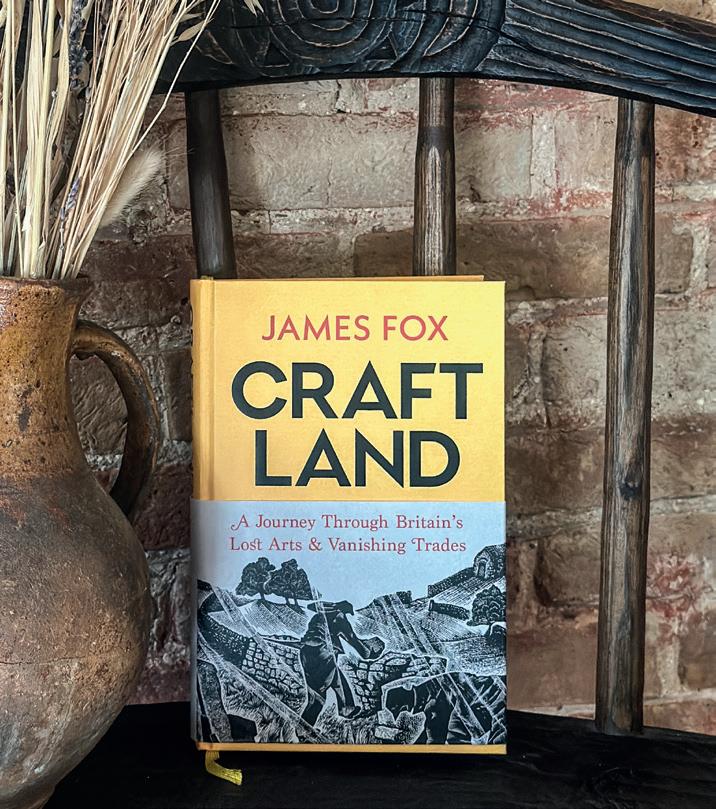readers ’ catalogue • winter 2025

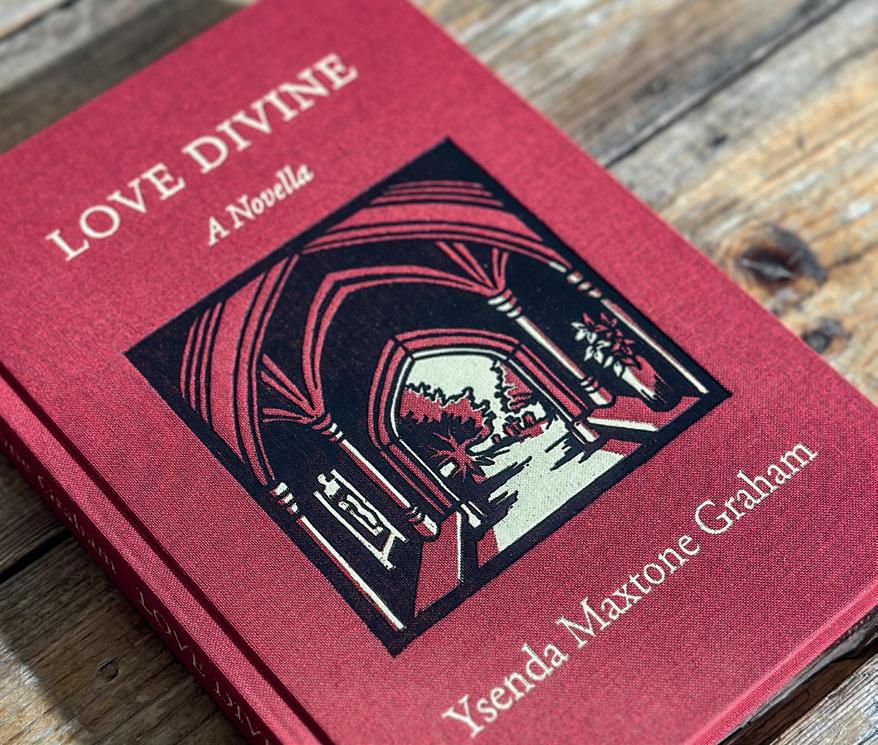

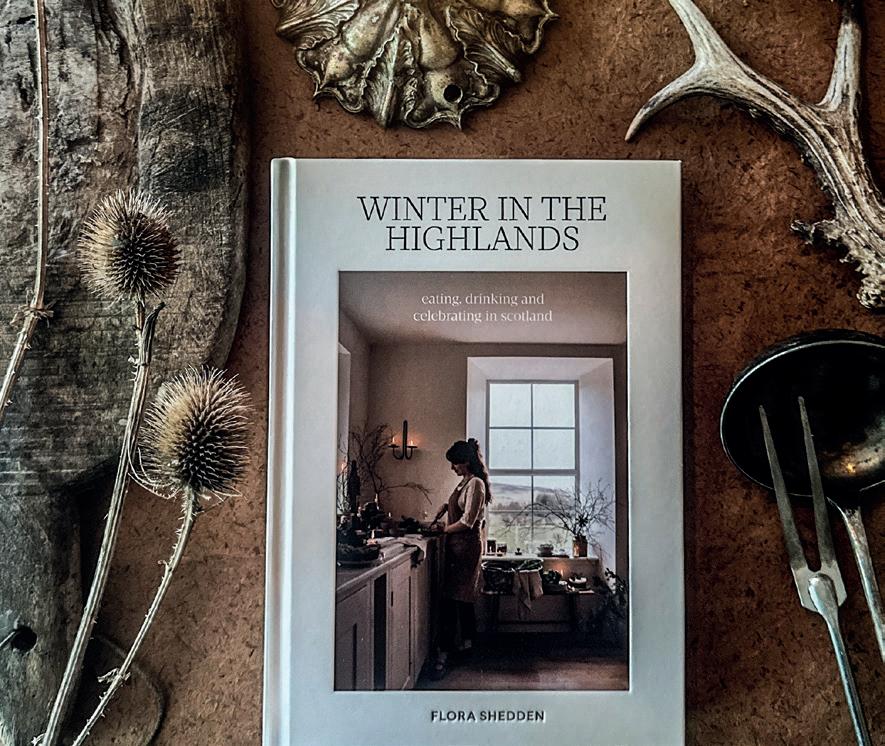

‘I recently made a list of essential spending and Slightly Foxed is on that list!’ L. Darcey
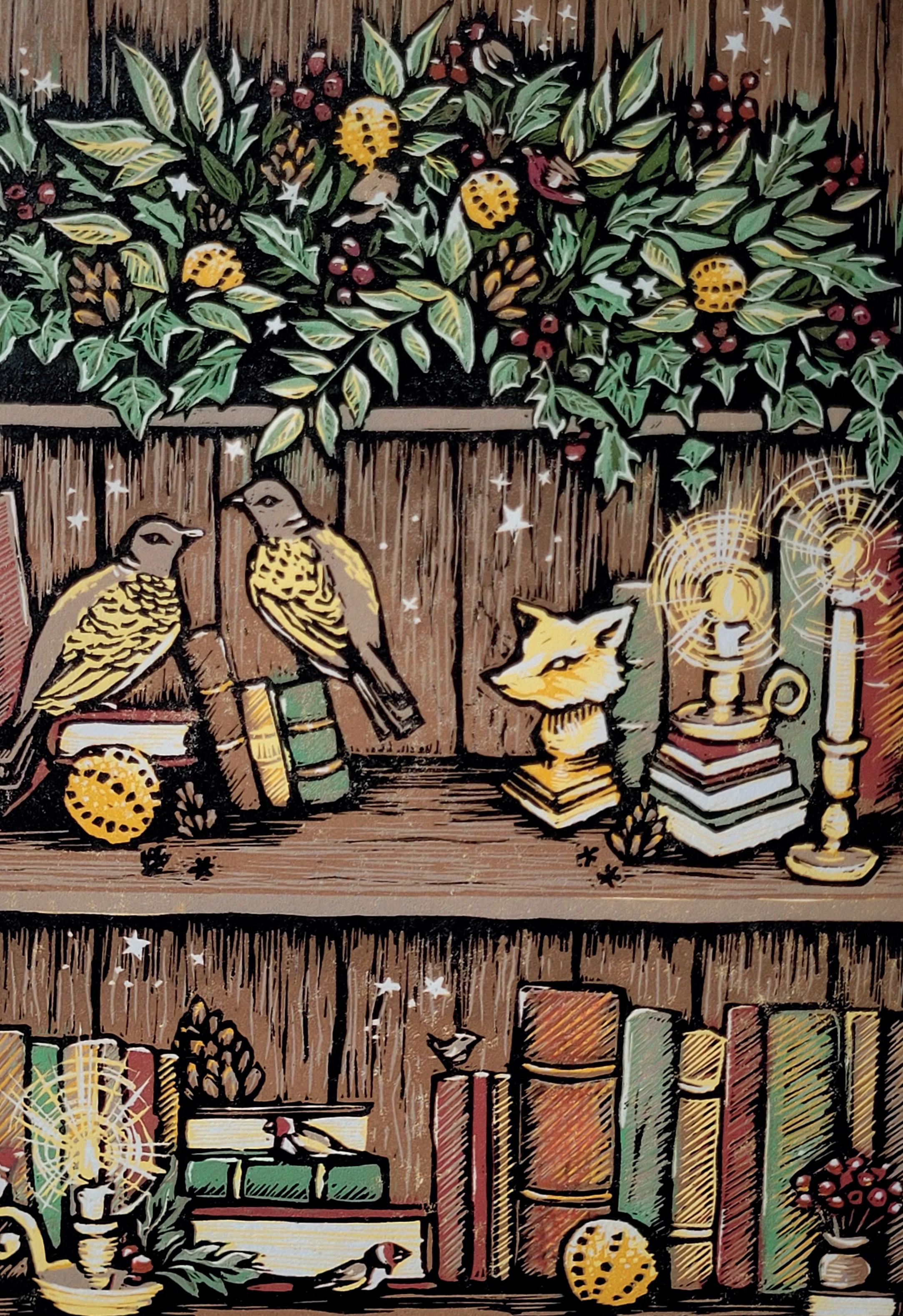

readers ’ catalogue • winter 2025





‘I recently made a list of essential spending and Slightly Foxed is on that list!’ L. Darcey

slightly foxed editions (format: 170 x 110mm)
These classic memoirs, each published in a limited and hand-numbered hardback pocket edition of 2,000 copies, are perfectly designed to curl up with – neat, sturdy little books, just the right size to hold in the hand. More important still, they’re wonderful reads –hitherto forgotten memoirs that bring alive a particular moment, that allow you into someone else’s world and make you feel you have actually known the writer. Elegantly bound in cloth, with coloured endpapers, silk head- and tailband and ribbon marker, these charming volumes are compulsively readable and irresistibly collectable.
plain foxed editions (format: 170 x 110mm)
Bound in duck-egg blue cloth, with a silk ribbon marker, gold blocking and a paper belly band, the Plain Editions are reissues of our most popular SF Editions. They come in the same neat hardback format as the original Editions but are unnumbered. They will happily fill any gaps in your collection, as well as forming a delightful series of their own.
slightly foxed cubs (format: 220 x 155mm)
These beautifully produced collectable children’s books strike a nostalgic chord with many readers and introduce a younger generation to writers whose work has often been allowed to slip out of print. Bound in coloured cloth, with printed endpapers and original illustrations, the Cubs make ideal presents, as stand-alone titles or in sets.
slightly foxed occasional books
In addition to our range of memoirs, biographies and children’s books we occasionally produce special seasonal releases and commonplace books.
Buy any four Slightly Foxed Editions and save £1 per book
Buy any four Plain Foxed Editions and save £1 per book
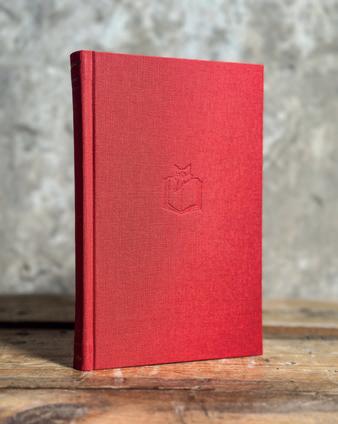
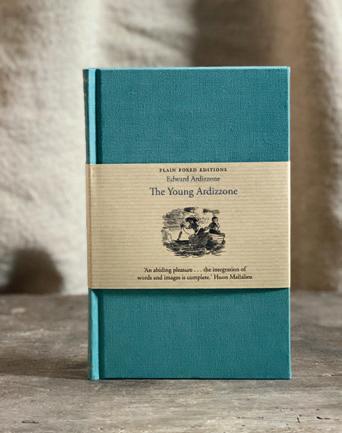
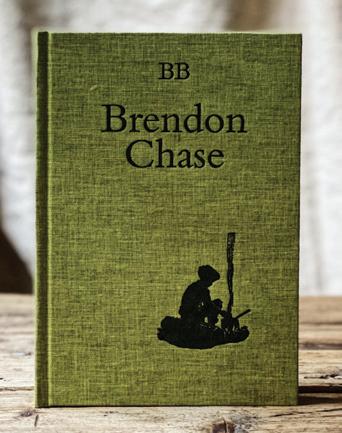
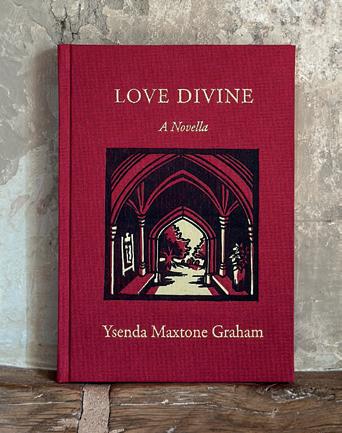
Welcome to the Readers’ Catalogue. Here you’ll find listings for our cloth-bound limitededition hardbacks, back issues of Slightly Foxed together with handsome slipcases in which to keep them, Plain Editions, our Cubs series of classic children’s fiction, a small collection of literary goods and our pick of titles from other publishers. We do hope you enjoy receiving it. Everything listed in this catalogue or on our website can be sent to you, or directly to a recipient, in good time for a date of your choice. SF subscribers can use their usual discount on all items, whether they are to be sent to you or to someone else. Non-subscribers may purchase all items at the undiscounted rates as usual. The office is well-stocked with smart gift cards, reams of brown paper, foxed ribbon and handsome gift boxes in anticipation.
Please note that we can also order many other books so if there’s a new or second-hand title you’re looking for that isn’t listed here or on our website (where you’ll also find hundreds of books recommended in past catalogues, back issues and on our podcast) do get in touch with the office staff and they will do their best to rootle it out for you.
With best wishes from Gail, Hazel and all of us here at Slightly Foxed
slightly foxed edition no. 73
‘Wanted. Dancers for Scandinavian tour. Must be experienced tap and ballet,’ read the advertisement in The Stage.
Constance Tomkinson was experienced at neither but, as she tells us in her gloriously funny memoir Les Girls, she was broke and desperate. To her astonishment she passed the audition and soon found herself in the chorus line of a company called the Millerettes and on her way to Sweden.
It was 1937, and work of any kind was hard to come by. Constance, the daughter of a Canadian Nonconformist minister, had already tried her luck as an actor after drama school in New York and then had moved on to London, where her only job so far had been in the pantomime chorus of a touring production of Dick Whittington. There was nothing very high-class about the Millerettes but a certain degree of competence was required. Constance didn’t have it but she was up for anything, and one of the delights of the book is the picture of its author as she gamely struggles to obey instructions, at one performance early on in the tour losing her balance and landing in the middle of the orchestra (‘The drummer, muttering Swedish curses, untangled me from the cymbals, pulled me off the drum, propped me up with his right hand and went on drumming with his left’). Alas, after Sweden no further bookings were forthcoming, so the girls decided to try their luck in Paris where, after a stint at the Folies-Bergère (then starring the fabulous Josephine Baker), Constance eventually joined a group called the Basil Beauties, touring the European capitals. The delectable memoir that came out of all this is not only a wryly observed picture of the seedy world of the chorus line and the touching esprit de corps that kept the girls going – even when ‘the stick make-up was worn down to little stumps and there was not an unbroken eyebrow liner’ – but an unusual glimpse of Europe on the eve of the Second World War, with Hitler and Mussolini in power, not long before the curtain finally came down.
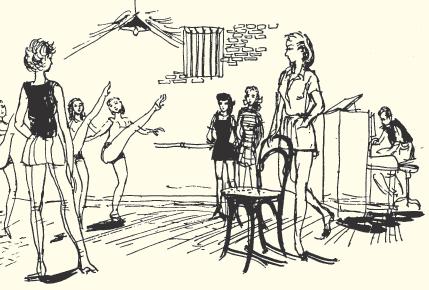
pub. 1 dec 2025 • cloth-bound hardback • limited edition of 2,000 • 170 x 110 mm • 272 pages • from £20
‘A
comic masterpiece, unputdownable (literally!). Austenesque in its portrayal of that marvellous cast of characters and the consequences of their actions.’
James Lefanu
It’s the first week in January, and the inhabitants of Lamley Green, a leafy village on the edge of London, are preparing to face the New Year. At No. 12 Holly Grove however the curtains remain closed. Lucy Fanthorpe’s husband Nick, respected lawyer and stalwart of the church choir, died unexpectedly on New Year’s Day and Lucy is in bed with her head under the duvet as letters of sympathy slip through the letterbox. Laid low by grief she’s also wracked by suspicion. Nick’s behaviour before he died was strange. Was he having an affair?
Meanwhile Lamley’s parish church St Luke’s is without a resident rector, and a team of retired priests and parishioners, under the leadership of Archdeacon Martin, is keeping the show on the road during the interregnum. An advertisement has been placed in the Church Times for a ‘collaborative and caring priest, with a passion for growth, who can build and sustain a vibrant and proactive team’.
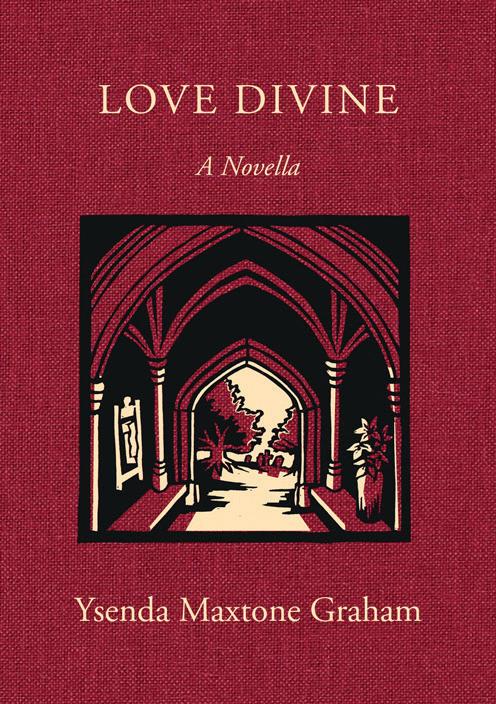
Just as the parish is in a state of flux and anxiety, so are its parishioners: grieving Lucy, Carol the lugubrious church volunteer, snobbish Elizabeth, commitment-phobic Vicki and Eliot trying to break even with their B&B, Latin master Hugh on the cusp of a solitary retirement, ruthless newcomer Chantelle who’s prepared to do anything to get her daughter into the oversubscribed church school, and Rachel the ordained sceptic who dares to speak her mind.
With her usual consummate skill, Ysenda Maxtone Graham, well-known to readers of Slightly Foxed for her hilarious and bestselling Terms & Conditions, brings together the members of this small community in a light-hearted but touching story which also points up affectionately but with deadly accuracy what’s wrong – and what’s right – with the modern C of E. Is Love Divine in the air? If so it will come in many unexpected guises.
pub. 1 nov 2025 • cloth-bound hardback 210 x 148 mm • 272 pages • from £20
‘This book is a joy . . . beautifully published by Slightly Foxed. Put it on your Christmas list right now!’ Adèle Geras
Ysenda Maxtone Graham, Mr Tibbits’s Catholic School
plain foxed edition • 200 pages • illus. • from £20
Like many of the best books, this unusual history of an unusual school – St Philip’s prep-school in Kensington, founded in 1934 by Catholic convert Richard Tibbits and still going strong today – is hard to classify. ‘As you live through its story,’ the author promises her readers, ‘you’ll be taken on a meander through the 20th century. War, rationing, smog, mini-skirts, strikes, Thatcherism, the first computer . . .’ Enough to say that for anyone who has enjoyed Decline and Fall or St Trinian’s, anyone who loves to laugh yet feels the poignancy of the passage of time, this book will be a treat.
Ysenda Maxtone Graham, Terms &
in Girls’ BoardingSchools, 1939–1979 • plain foxed edition • 272 pages • from £20
‘When I asked some girls who had been at Hatherop Castle in the 1960s whether the school had had a lab in those days they gave me a blank look. “A laboratory?” I expanded, hoping to jog their memories. “Oh that kind of lab!” one of them said. “I thought you meant a Labrador.”’ As we discover from this quietly hilarious history of life in British girls’ boarding-schools, this was a not untypical reaction. Harsh matrons, freezing dormitories and appalling food predominated, but occasionally these eccentric establishments imbued in their pupils a lifetime love of the arts and a thirst for self-education. In Terms & Conditions Ysenda speaks to members of a lost tribe – the Boarding-school Women, who look back on their experiences with a mixture of horror and humour.
Special Offer: Buy the Ysenda Maxtone Graham Collection – Love Divine, Mr Tibbits’s Catholic School and Terms & Conditions – and save £3.
Please see the order form or website for details
slightly foxed edition no. 74 • 200 pages • from £20 • pub. 1 mar 2026
Robert Westall, who died in 1993, produced some of the best children’s books to come out of the decades following the Second World War. His first novel, The Machine Gunners, won the 1975 Carnegie Medal (which he later won a second time, in addition to many other prizes). Though he never wrote a memoir he did leave behind some autobiographical sketches that take him from birth through school to the publication of his first book, and these were brilliantly woven together after his death by his partner Lindy McKinnel. Vivid and direct The Making of Me is an unforgettable picture of growing up in the working-class community of Tyneside during the 1930s and ’40s.
slightly foxed edition no. 72 • 392 pages • from £20
Geoffrey Wellum was still a 17-year-old schoolboy when, in March 1939, he volunteered to join the RAF – one of many teenagers inspired to join up at the time. What made him different was that he survived to write an account of his experiences so honest and so graphic that it still stands out as one of the best memoirs of flying in the Second World War, as the youngest Spitfire pilot in the prestigious 92 Squadron. Truly an incredible story and one that’s never been told by a braver, more open or more modest man.
slightly foxed edition no. 67 • 240 pages • from £20

This haunting memoir by a young nurse takes us into the wards of a casualty clearing station attached to the British Second Army in Normandy, which had landed a week after D-Day in June 1944. Very few of the patients in the hospital’s 121 camp beds will return to the front line, a few miles away. Pamela’s job is to stabilize the wounded for evacuation, or comfort them till they die. The medical staff work heroically in impossible conditions, but the first thing that strikes you about this young nurse is her extraordinary humility and her determination to learn. Somewhere in the background the war is taking its course, but this is not an account of the military campaign. It describes with complete honesty what working with the injured and the dying in a wartime situation feels like, in words that come straight from the heart.
plain foxed edition • 416 pages • from £20
Hermione, Countess of Ranfurly and her husband Dan had been married for less than a year when he was called up in September 1939. Their characterful cook-butler Whitaker volunteered to go with him, but Yeomanry rules decreed that though officers could take their servants to war they could not take their wives. Undeterred, however, Hermione immediately set off for Egypt in pursuit. Between snatched reunions with Dan, who was eventually taken prisoner, she worked for SOE in Cairo and as personal assistant to General ‘Jumbo’ Wilson in Jerusalem, entertaining everyone who was anyone from King Farouk to Evelyn Waugh. This sparkling diary, which she kept at the end of long working days, is both a passionate love story and a unique behind-the-scenes picture of the war in the Middle East and Europe as seen by a very unconventional aristocrat.
slightly foxed edition no. 49
236 pages • illus. • from £20
This sequel to Boy finds Dahl a representative of Shell, travelling the dirt roads of Tanganyika in an old station wagon visiting distant and often eccentric customers, the people who quite literally kept the machinery of Empire running. It was a free and adventurous life, but nothing like as hair-raising as what happened when war was declared and Dahl joined the RAF.
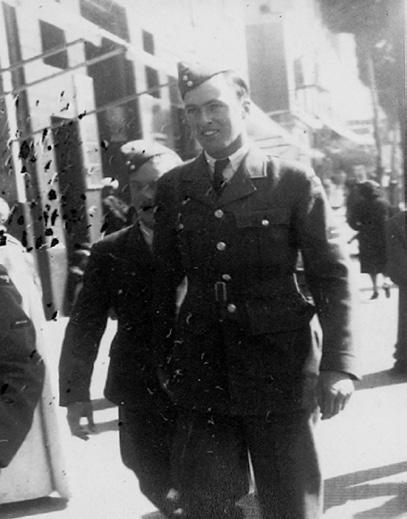
Flying solo in 1941 to join his new squadron, he crashed in the Western Desert and suffered horrendous injuries, but five months later he was up and off again to join the tiny British force attempting to defend Greece. He was clearly a brilliant pilot, and Going Solo is a story of extraordinary courage as well as a haunting evocation of the unspoiled beauty of East Africa in the 1930s and its now extinct breed of expatriates, ‘the craziest bunch of humans I shall ever meet’. Buy with Boy, see p.13
plain foxed edition • 384 pages • from £20
In 1934, shortly after Hitler’s rise to power, Christabel Burton, a beautiful woman from an influential Anglo-Irish family, married a liberal young German lawyer, Peter Bielenberg, and they settled in Berlin. When Allied bombing made the city too dangerous she fled with their children to a small village in the Black Forest, where she experienced a very different society from the Nazi-dominated one she had left behind. The Past Is Myself is her surprising account of life in that ‘other Germany’, and of her own nail-biting encounter with the Nazi regime.
plain foxed edition • 320 pages • from £20
In September 1944 John Hackett, commander of the 4th Parachute Brigade, was severely wounded and captured during the Battle of Arnhem. After being taken to a hospital in enemy hands and given emergency surgery, he was spirited away by the Dutch Resistance and hidden in a house owned by three middle-aged sisters, who risked their lives to nurse him back to health and help him escape down the canals of occupied Holland to the British lines. I Was a Stranger is less a war memoir than a story of friendship, a tribute by a very unusual soldier to a group of outstandingly brave, unassuming and resourceful people.
plain foxed edition • 320 pages • from £20
It’s hard to imagine that anyone who took part in the disaster of Dunkirk could write an amusing book about it. But that is what Anthony Rhodes has done in Sword of Bone, his wry account of the events leading up to the evacuation of the British Expeditionary Force in May 1940 – a ‘strategic withdrawal according to plan’ as the chaos was officially described.
Being observant and cool-headed, with an ironic sense of humour, he manages to capture the absurdity as well as the tragedy of what took place.
Katrin FitzHerbert, True to Both My Selves
slightly foxed edition no. 62 • 392 pages • from £20
By the time she was 14 Katrin FitzHerbert had lived in nearly thirty different places and attended fourteen schools – an unusual childhood, and the more so because it gave her two separate identities, one formed in Hitler’s Germany, the other in post-war England. In True to Both My Selves she tells the gripping story of her family, and of growing up as the child of a halfEnglish mother and a German father, a man she idolized but who was a committed member of the Nazi Party. With great courage and honesty she describes how she moved from a childhood dedicated to the ideals of National Socialism to face her past and make the final choice ‘between England and Papa’.
Charles Phillipson, Letters to Michael
slightly foxed occasional books
hb • 324 pages • illus. • from £22
Between the spring of 1945 and the autumn of Charles Phillipson wrote a series of 150 illustrated letters to his young son Michael, who had just started school. These delightful, quirky letters, designed to whet Michael’s appetite for reading, were done when Charles – a considerable artist who illustrated a number of children’s books – had already been diagnosed with multiple sclerosis, but they are full of the lightness and humour he still found in everyday situations, and full of encouragement for Michael’s own efforts. Preserved by his wife and son after his death in 1974, these Letters to Michael give a most touching picture of the relationship between a father and his young son.
Edward Ardizzone, The Young Ardizzone
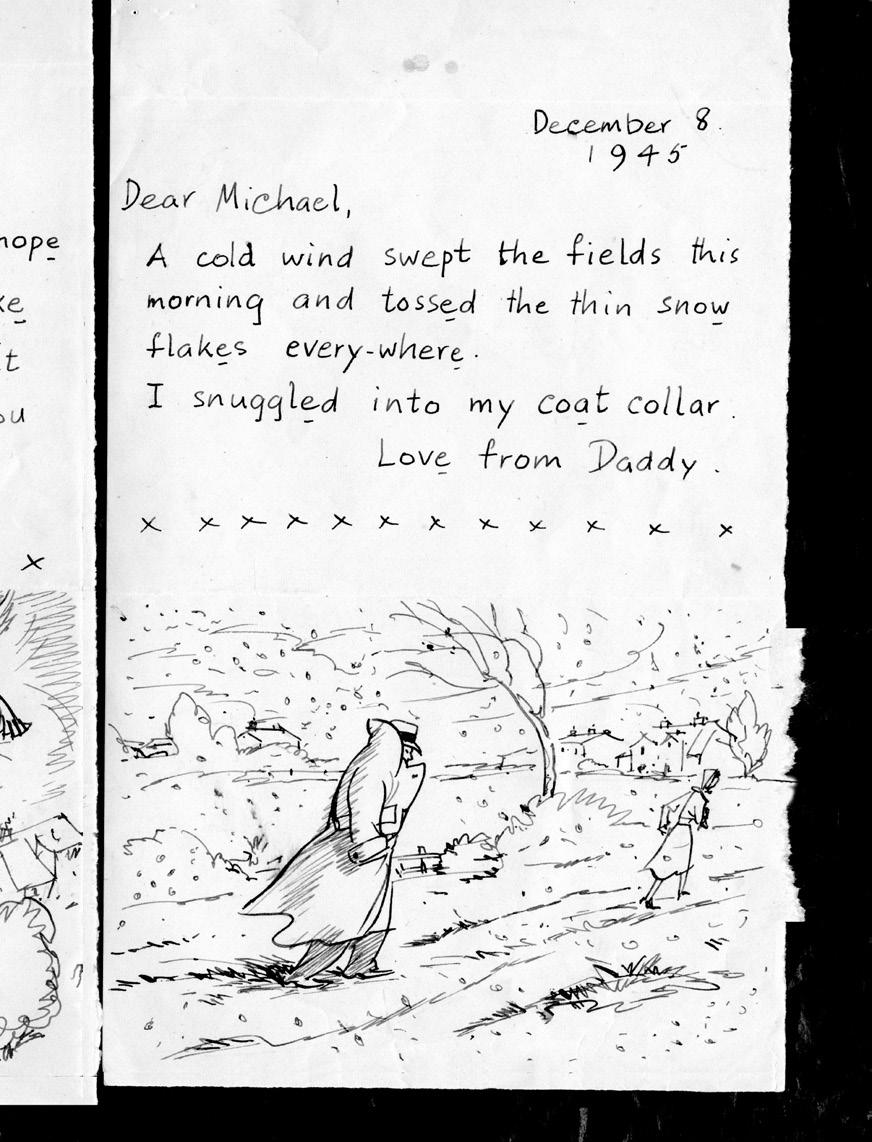
plain foxed edition • 216 pages • illus. • from £20
The creator of the ever-popular Little Tim and Lucy books begins his story in 1905 when he was 5 and his mother brought him and his two sisters home to England from Haiphong where his father was a telegraph engineer. Left in Suffolk in the care of their grandmother, the three
grew up with a full complement of young bachelor uncles, great-aunts and eccentric family friends – a comfortable Edwardian world which is beautifully captured in Ardizzone’s deceptively simple prose and delicately humorous drawings.
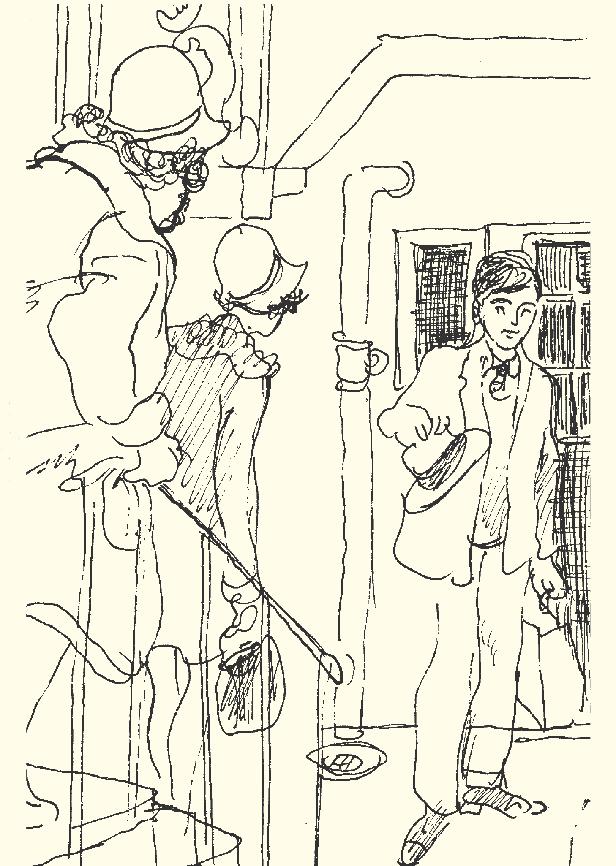
plain foxed edition • 208 pages • illus. • from £20
In 1926, at the age of 16, Richard Kennedy left school without a single qualification and went to work at the Hogarth Press. The Woolfs clearly developed a fondness for their apprentice, but when he left several years later, Leonard pronounced him ‘the most frightful idiot he [had] ever had the privilege of meeting in a long career of suffering fools’. But Kennedy, who became a successful artist and children’s book illustrator, was taking everything in, and 50 years later he produced a minor classic in A Boy at the Hogarth Press, accompanied by his own wonderfully alive illustrations. Later still, he wrote his touching childhood memoir, A Parcel of Time. Now published together in a single edition, the two are a sheer delight.
plain foxed edition • 320 pages • illus. • from £20
Gwen Raverat is best-known for her glorious wood engravings, but in her childhood memoir Period Piece she created a perfect small masterpiece of another kind – a deliciously funny, affectionate and atmospheric picture of life in the small world of 19th-century academic Cambridge among the eccentric Darwin clan. Illustrated with Gwen’s own delightful drawings, it not only brilliantly captures a moment in time but also shows us the making of the artist Gwen was to become. As Rose Macaulay wrote when it was first published, it is ‘funny, witty, beautifully written, more than beautifully illustrated, everything such a book can be’.
slightly foxed edition no. 40 • 216 pages • illus. • from £20
Erich Kästner, author of the immortal children’s book Emil and the Detectives, was born at the end of the 19th century in Dresden – that ‘wonderful city full of art and history’ which was razed to the ground by the Allies in 1945. Erich’s gentle father Emil, a master saddler, and his mother Ida, an intelligent woman who set up as a hairdresser, had come to Dresden from small-town Saxony. Times were tough, and Erich grew up in a tenement flat at the shabby end of a long street called the Königsbrücker Strasse. Yet the book shines with the everyday happiness of life in a close-knit, hardworking family, set against the backdrop of the ancient city with its baroque buildings, its parades before the Kaiser, its trams and glittering shops. When I Was a Little Boy is an affecting picture of both Erich’s childhood and the city he never ceased to mourn.
Nicholas Fisk, Pig Ignorant
slightly foxed edition no. 65
160 pages • illus. james nunn • from £20
In this endearingly honest memoir the bestselling children’s writer Nicholas Fisk (Trillions, Grinny and A Rag, a Bone and a Hank of Hair) lays bare his teenage soul as he takes us into the world of late 1930s London suburbia where he grew up. On the surface it’s a comforting place of ‘horse-drawn milk-floats, lorries delivering Corona soft drinks, postmen with conical hats peaked in front and behind, and “Wallsie”, the Walls Ice-Cream man pedalling his freezerbox trike’. But underneath it’s all embarrassment and uncertainty for Nick, the third-person narrator, as he experiences the Blitz, gets his first job with a theatrical agency, finds his faltering way into the Soho jazz clubs where he moonlights as a guitarist, and finally begins to write.
Nella Last’s War: The Second World War Diaries of Housewife, 49
Richard Broad and Suzie Fleming (eds.)
slightly foxed edition no. 60 • 392 pages • from £20
In 1937 the social research group Mass Observation set about creating a record of everyday life in Britain by recruiting 500 volunteer diarists. One of these was Nella Last, a housewife living in Barrow-in-Furness with a husband and two grown-up sons, one a trainee tax-inspector and the other in the army. So far, so seemingly ordinary, but there was nothing ordinary about Nella. Her account of life in wartime Britain is not only an unrivalled piece of social history but also the portrait of a woman you feel could have run the country, given half a chance.
slightly foxed edition no. 70 • 288 pages • from £20
‘Of course I have no right whatsoever to write down the truth about my life, involving as it naturally does the lives of so many other people . . .’ wrote Vita Sackville-West in July 1920. But write it down she did, and when in 1973 her son Nigel took the decision to publish Vita’s account of her passionate love affair with Violet Trefusis along with his own reflections on his parents’ marriage, he feared he might be prosecuted for obscenity. Though attitudes have since changed, Vita’s account of a forbidden relationship which nearly destroyed her marriage to the writer and diplomat Harold Nicolson is still both fascinating and disturbing.
slightly foxed occasional books • 112 pages • from £14.50
‘Variety, the unexpected, a bit of vulgarity and the ridiculous mixed in with the elevated,’ is what we are given in this wide-ranging collection by a well-read man with a sharp eye, an ironic – indeed very English – sense of humour and a devotion to history. Ranging over the centuries, it contains a rich mix of often arresting facts, vivid descriptions, absurd observations
and wise words. Sir Christopher Wren rubs shoulders with Eddie Izzard, Princess Margaret with Elizabeth I. And all organized under subject headings to help find that appropriate quote. Above all it gives us a perspective on our own history via the voices of those who were living it, reminding us that the past was not a rehearsal for the present, that there is no substitute for the horse’s mouth. Altogether a book for the times and a perfect present for a thoughtful and humorous friend.
plain foxed edition • 240 pages • from £20
In the drab and traumatized post-war London of 1949, Marks & Co., second-hand and antiquarian booksellers at 84, Charing Cross Road, received an enquiry from ‘a poor writer with an antiquarian taste in books’, a Miss Helene Hanff of New York City. It was not the kind of letter they were accustomed to receiving, but it was one that would make history. After a while, letters between the feisty, eccentric New York writer and the staff of the bookshop began to encompass much more than books. Soon the whole office was joining in, slipping in notes about their families, describing life in London, and thanking her for the food parcels she sent from New York. It’s a gloriously heart-warming read, the account of a friendship – almost a love story – conducted through books.
slightly foxed edition no. 61 • 256 pages • from £20
During the 1950s an unusual event took place at Pinewood Studios: the filming of The Prince and the Showgirl, a light comedy starring Sir Laurence Olivier and Marilyn Monroe as the two leads. This unlikely combination proved to be a disaster – Marilyn failed to turn up on time and could barely act or remember her lines, while Sir Laurence was completely out of his depth with her and her very un-British entourage. The film appeared and sank without trace, but fortunately Colin Clark, a cheeky young man working on set as a general dogsbody, was there to record the agonies of its making in this sharp and hilarious diary.
slightly foxed edition no. 69 • 256 pages • from £20
This fictional diary, which has many echoes of E. M. Delafield’s own life, first appeared in instalments in Time and Tide. It was an immediate hit, speaking as it did to the millions of middle-class wives trapped in dull conventional marriages, struggling to pay the bills and keep up appearances in those difficult inter-war years. For us, the setting is different, but the brisk, unself-pitying voice of the Provincial Lady – married to the dependable but deeply boring Robert – still rings true. A funny, wryly observed picture of a marriage between the wars that anticipates those journalistic columns describing life in the ‘squeezed middle’ today.
plain foxed edition • 272 pages • from £20
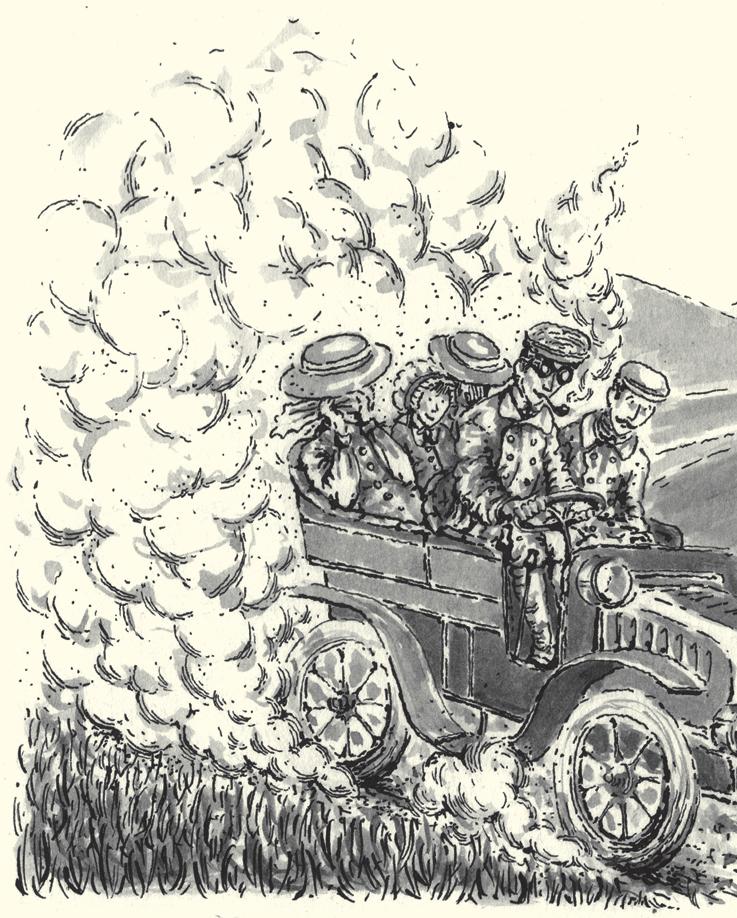
Best known for her first novel I Capture the Castle, for the evergreen The Hundred and One Dalmatians, and for Dear Octopus, her 1938 play set at a family reunion, Dodie did not publish this account of her early life until 1974 when she was 78. Brought up among her mother’s family since her father had died when she was a baby, Dodie spent her childhood surrounded by doting adults. It was the jolliest environment imaginable – the Furbers adored seaside trips, motorcar outings, fairgrounds, circuses, jokes, charades and musical soirées. Above all they loved the theatre, and it was through her bachelor uncles’ involvement in amateur dramatics that she conceived her passion for the stage. Her memoir gives a wonderful picture of this large extended family and of the funny, complicated, creative little girl who would later say of herself, ‘I think I’m an oddity really, but I do my very, very best to write well’.
plain foxed edition • 288 pages • from £20
Diana Holman-Hunt spent her Edwardian childhood shuttling between two wildly contrasting grandparents. Her paternal grandmother, the eccentric widow of the Pre-Raphaelite painter Holman Hunt, lived entirely in the past in her big gaunt house in Kensington, while her mother’s mother, in her comfortable and well ordered home on the edge of the Sussex marshes, lived entirely in the present. Both competed for Diana’s affection while being spectacularly blind to her needs. My Grandmothers and I is Diana’s touching and darkly funny memoir of that time – a small comic masterpiece of pitch-perfect dialogue and deadpan observation.
slightly foxed edition no. 48 • 184 pages • illus. • from £20 It’s easy to see from this childhood memoir where the ogres who people Dahl’s fiction come from: the vengeful and filthy fingernailed sweetshop owner Mrs Pratchett, the school doctor who lances little Ellis’s boil in such a heartless manner, the creepy headmaster of Repton who wields the cane with unacceptable relish. But there’s another, far more cheerful side to the story in the person of Dahl’s adored mother Sofie who, widowed at 35 with six children to care for, nevertheless managed to leave them with idyllic childhood memories. Like many individualists, Dahl never fitted in at school and was ecstatic when he finally escaped to work for Shell,
setting off for East Africa with the same infectious bounce and enthusiasm that permeate this irresistible little book. Buy with Going Solo, see p.8
slightly foxed edition no. 69 • 256 pages • from £20
Born in 1893, the writer Dorothy Whipple grew up in the mill town of Blackburn, Lancashire, in a large, cheerful, middle-class family, with affectionate parents, friends to play with, her adored maternal grandmother near enough for dropping in, and a full complement of highspirited young uncles and aunts. On the surface The Other Day is the account of an idyllic childhood, but Dorothy Whipple’s genius is not only to bring this small world vividly alive but also to show the gulf of perception that exists between children and the adults who look after them. Though nothing overtly dramatic happens, this warm and funny memoir is a real page-turner.
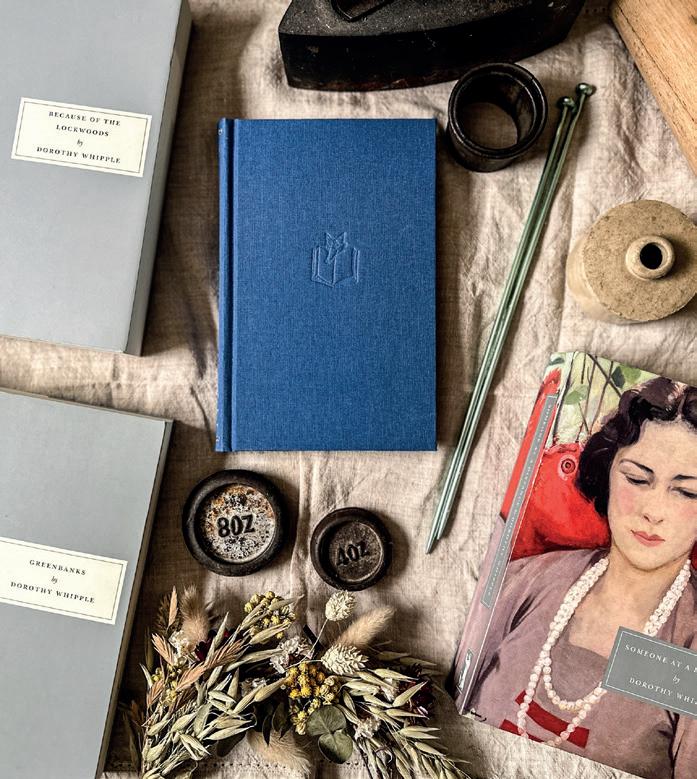
plain foxed edition • 208 pages • from £20
Rosemary Sutcliff is one of Britain’s most distinguished children’s writers. Born in 1920, the only child of a naval father and a pretty, manic-depressive mother, Rosemary suffered from juvenile arthritis, which burned its way through her, leaving her permanently disabled. Yet Blue Remembered Hills is the very opposite of a misery memoir, full of poetry, humour, affection, and joy in people and the natural world. Blue Remembered Hills is the unforgettable record of the making of a writer. For Rosemary Sutcliff’s celebrated historical adventure novels, see p. 29
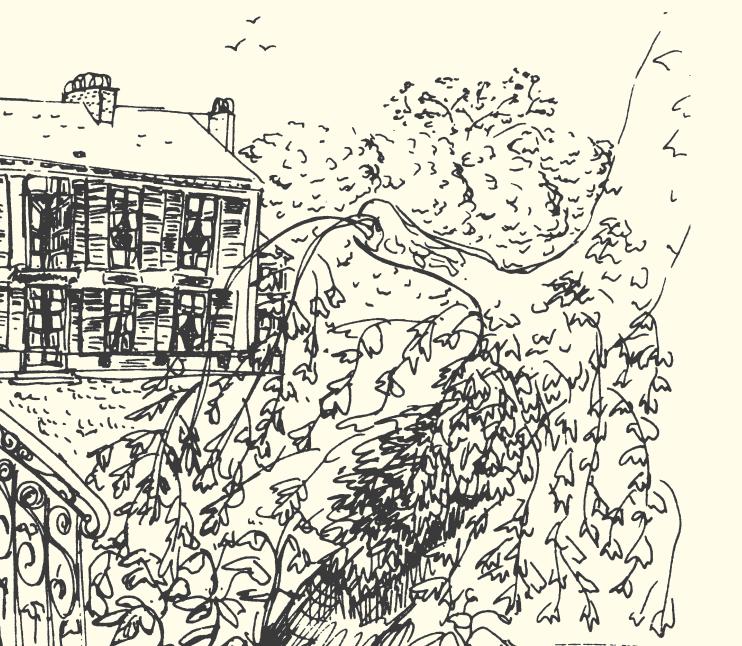
plain foxed edition • 208 pages • from £20
In 1951, a shy and solitary 14-year-old boy was sent by his parents to spend the summer with ‘the aunts in Flanders’. His account of those months in the dignified old French country house on the edge of the Flanders Plain has an idyllic, dream-like quality. Yet all was not as idyllic as at first it seemed. Gradually he teases out the history of the family and of the surrounding area and finally uncovers the secret at the heart of the book – the reason he has been sent there.
Diana Petre, The Secret Orchard of Roger Ackerley
slightly foxed edition no. 33 • 272 pages • from £20 ‘“It was Uncle who was your father,” she said. 1 January 1930. We were in Vienna, just the two of us . . . This was the eighteenth New Year’s Day of my life. I was still seventeen and I was still rather desperately awaiting the start of a year in which my world as I knew it should be utterly changed . . . This was exactly the sort of New Year’s Day I had been craving ever since I could remember: an unimaginable shake-up. Now, at last, it had come.’
Diana and her twin sisters grew up in Barnes, South London, in the care of an elderly housekeeper, having been abandoned in 1912 by their mother, the enigmatic Mrs Muriel Perry, whose real name and true identity were a mystery. After an absence of ten years, Muriel reappeared and took charge of her children, with disastrous results. For the girls, one of the highlights of their isolated lives were visits from a kindly man they knew as ‘Uncle Bodger’. In fact, as Muriel finally revealed, he was their father, Roger Ackerley.
slightly foxed paperback • 240 pages • illus. • from £12 China in 1975 was a strange, undiscovered country, still half-mad from Mao’s Cultural Revolution, when young Frances Wood boarded a plane in London to study for a year in Peking. Virtually closed to outsiders for the preceding decade, China was just beginning to make tentative moves towards the outside world when Frances and her fellow students were driven through the dark silent countryside to their new quarters at the Foreign Languages Institute. Throughout the following year in an extraordinary Alice-in-Wonderland world where ‘education’ consisted of shovelling rubble, hand-grenade practice and cripplingly tedious ideological lectures, Frances never lost her sense of humour. Based on the letters she wrote home, Hand-grenade Practice in Peking is both affecting and hilarious.
slightly foxed edition no. 41 • 256 pages • from £20
Who would have thought that the adventurous traveller and decorated wartime hero Eric Newby had started his working life in the rag trade? But that is the story he tells in this characteristically jaunty and very funny book. Lane & Newby, ‘Mantle Makers and Wholesale Costumiers’, occupied a warren of offices in Great Marlborough Street. Here young Eric was put to work in the Mantle Department and forced to accompany Mr Wilkins, the head salesman, on his twice yearly excursions to drum up orders in the great industrial towns of the North. As Eric blundered his way through the various departments, things were beginning to go wrong. Eric’s father, an Edwardian patriarch with a light-hearted attitude to accounting, had been running up debts, and during the 1950s Lane & Newby finally collapsed. By this time, however, Eric was laying plans for an excursion to the Hindu Kush – and the rest is travel history.
James Lees-Milne, Another Self
plain foxed edition • 256 pages • from £20
A deeply religious child, Lees-Milne spent much of his childhood wandering dreamily in the grounds of his parents’ medieval manor house, Wickhamford Manor in Worcestershire. It gave him a nostalgia for the past and a love of historic buildings which would lead to his later distinguished career with the National Trust. Droll, shy and sexually ambivalent, Lees-Milne wrote that he ‘always felt an outsider in every circle’. It was this, combined with his eye for detail and highly developed sense of the ridiculous, that made him such a wonderful comic writer. John Betjeman compared the impact of Another Self to that of Evelyn Waugh’s Decline and Fall.
Jennie Erdal, Ghosting
slightly foxed edition no. 43 • 304 pages • from £20
‘A large sapphire on the lapel of a bold striped suit, a vivid silk tie so bright that it dazzles . . . on his fingers a collection of jewels . . .’ – this is the man Jennie Erdal calls ‘Tiger’, the flamboyant figure at the centre of Ghosting, the strange and gripping story of the 20 years in which she became his ghost writer. Erdal created a whole literary oeuvre in his name, and even turned his ludicrous plot ideas and sexual fantasies into novels that were seriously and admiringly reviewed. Ghosting is a wickedly funny book, but it is also a thoughtful look at deception and self-deception, and the masks that most of us wear.
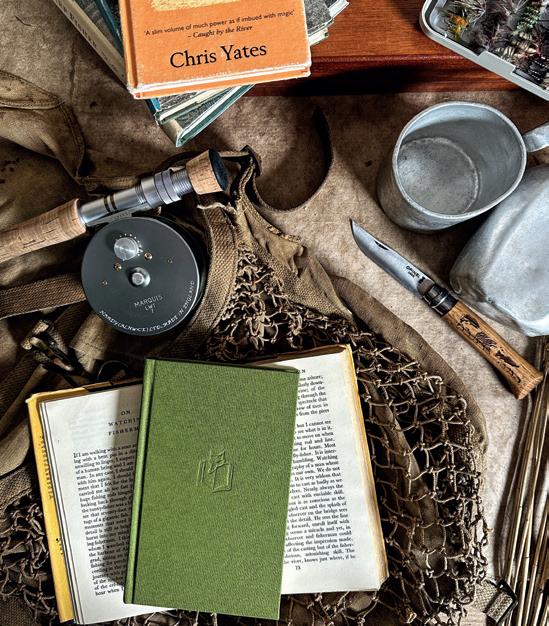
Luke Jennings, Blood Knots
slightly foxed edition no. 63
2 24 pages • from £20
As a child in the 1960s, Luke Jennings was fascinated by the rivers and lakes around his Sussex home. Within their depths he sensed strange and mysterious worlds. In this beautiful and original memoir he describes how his passion for fly fishing gradually took hold, with the help of books from the library and the encouragement of his two boyhood heroes – his father, who had been awarded the Military Cross for bravery in the war, in which he had been badly burnt, and Robert Nairac, a charismatic figure who first befriended him as a teacher at his public school. As one might expect from an author who is, among other things, the dance critic of the Observer and the author of the Killing Eve novels, these two themes of fishing and friendship are woven together to produce a book of unusual subtlety that’s about a great deal more than fishing.
Richard Cobb, A Classical Education
slightly foxed edition no. 64 • 224 pages • from £20
Everything about the historian Richard Cobb was unexpected, especially his writing. A Classical Education is no exception, a memoir that’s more like a psychological thriller. Cobb and his friend Edward (surname withheld) were given the ‘classical education’ of the title at their public
school, Shrewsbury, where they became friendly enough to visit one another’s homes in the holidays. But whereas Cobb came from an exemplarily safe and conventional middle-class family, Edward’s was entirely the reverse. Enough to say that his nicknames for his parents were Moloch and Medea. The result was a shocking murder, on which Cobb looks back with wonder and dismay when he meets Edward again fourteen years later. A Classical Education is a book you won’t be able to put down. Buy with Still Life, see p.18.
Fadiman,
slightly foxed edition no. 57 • 204 pages • from £20 ‘Aside from his books, he loved nothing – and no one – longer, more ardently, or more faithfully than he loved wine.’ The celebrated American author, editor and essayist Anne Fadiman was born in 1953 into a family of booklovers and writers. Her mother Annalee was the only female war correspondent in China during the Second World War, and her father Clifton was a successful author, critic, columnist, publisher and MC of the popular NBC radio quiz show Information Please. Anne and her brother Kim grew up surrounded by thousands of books and the entire family were committed ‘sesquipedalians’, besotted with very long words. The effect of this ‘pathologically bookish’ childhood was celebrated in Anne’s well-loved collection of warm and witty essays, Ex Libris: Confessions of a Common Reader. The Wine Loving Father might be a more apt title for this affectionate but clear-eyed memoir. Not just a book for wine buffs, but one that evokes the atmosphere of a whole era of American life.
slightly foxed edition no. 66 • 288 pages • from £20
In the winter of 1996, 23-year-old Joanna Rakoff moved to New York City and took a job as assistant to a colourful, old-style literary agent whose wood-panelled office on Forty-Ninth Street was still stuck in the era of the typewriter, the Dictaphone and the photocopier. One of the Agency’s chief clients was J. D. Salinger, and when Rakoff was given the task of dealing with the steady stream of fan mail to the famously reclusive novelist she found herself becoming emotionally involved. Instead of sending the usual form letter, she started writing back. In this deliciously funny coming-of-age memoir, set against the backdrop of 1990s New York and the eccentric world of the Agency, she describes what happened next.
Jan Morris, Conundrum
slightly foxed edition no. 46 • 200 pages • from £20
‘I was three or perhaps four years old when I realized I had been born into the wrong body and should really be a girl. I remember the moment well, and it is the earliest memory of my life.’ In 1972 James Morris booked a return ticket to Casablanca and underwent what would now be called gender reassignment surgery. Soon afterwards Jan Morris wrote a book about what it had felt like to live – or try to live – for forty odd years with the absolute conviction that she
was a woman trapped in a man’s body, and how this agony had finally been resolved. Although Morris was not the first person to undergo this operation, she was probably the best known and apparently the least likely. After Oxford, and service in Intelligence during the Second World War, James Morris became a daring foreign reporter who scooped news of the first ascent of Everest in 1953. During the 1950s and ’60s Morris also produced a succession of brilliant travel books. And Morris was married with four children – a partnership of complete trust and openness which survived to the end. How James finally became Jan is an extraordinary story, and her memoir Conundrum is a gripping and thought-provoking read.
slightly foxed edition no. 54 240 pages • illus. • from £20
When Laurie Lee set out on foot from his home in the Gloucestershire village of Slad one midsummer morning in 1935 he was 19 and off to see the world with only his violin for company. So began a year of wandering that eventually took him from the north to the south of Spain, a country in which life had barely changed since the Middle Ages but which was now on the brink of a bitter civil war. The adventure that began as a romantic dream ended somewhat ignominiously, but it inspired Lee to produce this brilliant and darkly haunting account of a vanished Spain, and return to fight on the Republican side not long after. Buy with Cider with Rosie, see p.20.
plain foxed edition • 232 pages • from £20
When Dame Hilary Mantel died, many readers of her novels learned more about her life and her heroic struggle with the serious medical condition from which she suffered for many years without a diagnosis. Nowhere is this more vividly or more movingly described than in her own powerful and haunting memoir. Giving up the Ghost is a story of ‘wraiths and phantoms’, and of a life full of challenges. Compulsively readable, it is ultimately an optimistic account of what made Hilary Mantel the writer she became, full of courage, insight and wry humour.
slightly foxed edition no. 55 • 224 pages • from £20
The historian Richard Cobb, famous for his brilliant books on France and the French Revolution, his inspirational teaching and his unconventional behaviour, grew up in the 1920s and ’30s in the quiet and deeply conventional town of Tunbridge Wells. Yet Cobb loved that small world – it was, he writes, ‘a society in which a rather frightened child could feel secure’. In this unusual memoir, he leads us through the town and into the lives of the characters among whom he grew up, from the mysterious Black Widow, seen always in deep yet unexplained
mourning, to Baroness Olga, the town’s only victim of the Russian Revolution. At home his mother entertains her tweed-and-Jaeger-clad Bridge-playing friends while down the road in their large, dank Victorian mansion his extraordinary cousins the Limbury-Buses live their lives according to an unchanging regime which is timed to the minute. ‘Strange and wonderful,’ wrote Hilary Spurling in the Observer when the book was first published. And indeed it is.
plain foxed edition • 224 pages • from £20
Graham Greene said that writing this memoir of his early years ‘was in the nature of a psychoanalysis. I made a long journey through time and I was one of my characters.’ Certainly the younger self that emerges is as complex and intriguing as any of those he created in his novels. A Sort of Life takes him through Oxford, early married life and conversion to Catholicism, to the point where, against all advice, he gives up his safe job on The Times in order to write. This extraordinary memoir is, to quote Frances Donnelly’s introduction, ‘an act of great intimacy’, taking us through all the false starts and griefs that fired the engine of Greene’s desire to write, and laying out the issues and themes which would dominate his later great novels.
slightly foxed edition no. 71 • 224 pages • from £20
Nigel Slater, OBE, is perhaps Britain’s most treasured food writer, loved by cooks the nation over for his comfortingly do-able recipes and his colourful writing, the companionable tone of his bestselling cookbooks and his longstanding column in the Observer. In his funny and poignant memoir he describes the ingredients that combined to make him the cookery writer he is today – a childhood that certainly had very little that was comfortable about it. The book is subtitled ‘the story of a boy’s hunger’, and it is through food, ranging from the irresistible to the revolting, that Nigel relives his experiences of survival, growing up and final escape.
slightly foxed edition no. 52
320 pages • from £20
In this funny and perceptive memoir Jessica Mitford describes growing up as the fifth of the six notoriously headstrong Mitford sisters. An isolated childhood in the hideous Cotswold house built by their father Lord Redesdale, where life centred round the church and the Conservative Party, turned ‘Decca’ as she was known into a lifelong socialist. At 18 she made her escape, eloping spectacularly with her charismatic left-wing cousin Esmond Romilly, moving to the East End of London and then running a bar in Miami. It’s a story of sheer bravado brilliantly told by one of the most eccentric members of an eccentric family.
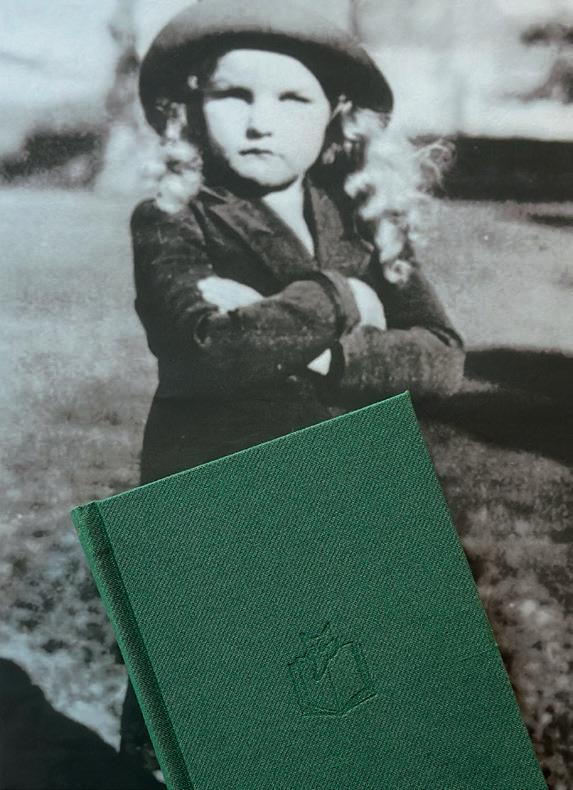
Laurie Lee, Cider with Rosie
plain foxed edition
272 pages • from £20
Laurie Lee was born in Stroud in 1914 and in 1917 the family moved to a damp and crumbling cottage in the remote Cotswold village of Slad. When the First World War was over Laurie’s father abandoned his wife and children and life was hard, but for Laurie his warm hugger-mugger home and the village with its familiar characters and unchanging round were full of wonder. He writes ecstatically of going blackberrying in summer, and skating and carol singing in icy Christmas weather when it hurt to breathe and the air was ‘like needles’. Yet he acknowledges that village life could be brutal too. Cider with Rosie is not just a rosy picture of a rural past, but a magical evocation of growing up in a lost world that still rings emotionally true.
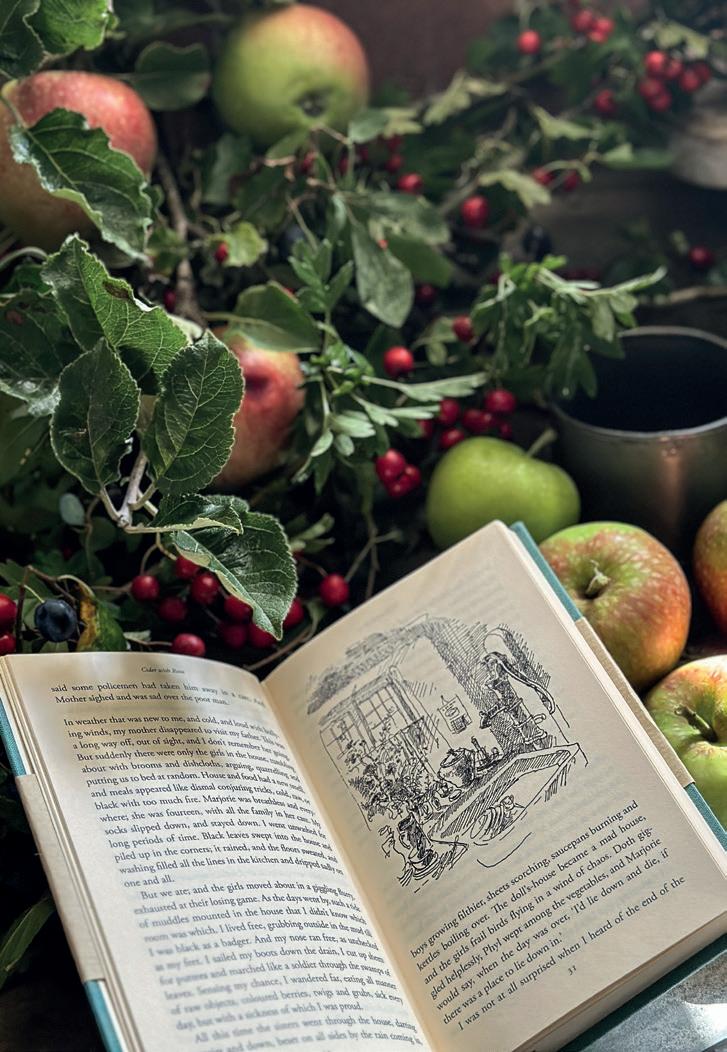
‘I have written a book which gives me much pleasure. It is a kind of full-length portrait of a small country town – this small town –between the wars. The sort of life that will never come back.’ So John Moore
wrote to T. H. White in the summer of 1945.
That book was Portrait of Elmbury, the first volume in the trilogy based on his home town that Moore wrote shortly after the Second World War, following it in 1946 with Brensham Village and in 1948 with The Blue Field. Together the three books paint a picture of a lost rural world which is powerfully nostalgic yet unsentimental. Born in 1907, Moore grew up in Tewkesbury at a time when such small English market towns had a sturdy and independent life of their own. Mass travel, mass media and the changes brought about by two world wars would gradually destroy this self-contained society, but in Portrait of Elmbury Moore caught and preserved it and its inhabitants in captivating detail, from the wild and drunken inhabitants of the slums in Double Alley to Miss Benedict, the disapproving bar-
maid at the Shakespeare (the town had 28 pubs and a population of 5,000).
Brensham Village moves the story onward to the 1930s and from Elmbury to a small village nearby. Now there is unemployment, and change is creeping in, with mannerless weekenders arriving from the city, a shady ‘Syndicate’ of developers, an ugly petrol station and a local cinema. But there is still cricket on the village green, and fishing, ferreting and bird’s-nesting for Moore and his friends.
The final volume, The Blue Field, set in 1948, focuses on a single farm and the life of its owner, the wild and intractable William Hart, master wagon-maker and defender of individual liberties against increasing interference from the State. He is the man responsible for the field of blue linseed, grown in defiance of the War Agricultural Executive Committee, which flowers one summer morning on Brensham Hill.
Though Moore wrote many more books and spent time in London, he always returned to Tewkesbury – for him a place where somehow ‘emotions seemed larger, pleasures were keener, sorrows sharper, the tragedy more profound and the comedy more riotous’ – and it is for his wonderful Brensham trilogy that he is best known.
Portrait of Elmbury (PF Edition), Brensham Village & The Blue Field (SFE nos. 34 & 42)
Subscribers: UK £57; overseas £66 *save £9
Non-Subscribers: UK £63; overseas £72 *save £3
Flora Thompson, Lark Rise and Over to Candleford & Candleford Green
slightly foxed edition nos. 58 & 59 • 328 & 400 pages • from £20 per title
Flora Thompson wrote the much-loved trilogy known as Lark Rise to Candleford in the grim days before and during the Second World War, and perhaps it was this that made the memories of her country childhood shine so brightly. She grew up as the daughter of a builder’s labourer in a poor Oxfordshire hamlet in the last years of the nineteenth century, yet she instinctively knew how to write, and these books are a unique record of a rural world that would soon disappear for ever.
The first book sees Flora – or Laura, as she called her childhood self – growing up in the hamlet of Juniper Hill, the ‘Lark Rise’ of the title. From the annual killing of the pig to the flowers in the cottage gardens, and the memories of the older residents, the life of the hamlet is recalled in magical detail, a closeup, child’s-eye view of a small, self-sufficient world.
In Over to Candleford life begins to open out for Flora when she goes to visit her father’s relations in the local market town where she makes particular friends with her uncle Tom, a liberal thinker
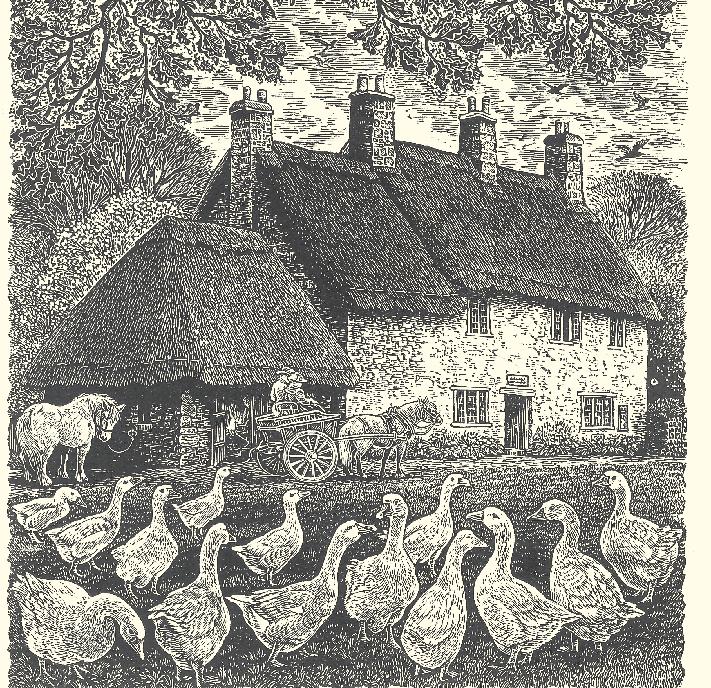
and respected craftsman, who shares with her his love of books and his talent for attracting interesting and often eccentric people.
Back at home and now in her teens, Laura is restless and undecided about her future, until news comes of a vacancy for an assistant at the Post Office in a nearby village. Candleford Green is an enchanting picture of Flora’s new life in this colourful community and of Dorcas Lane, her redoubtable – and unforgettable – employer. ‘You are going to be loved by people you’ve never seen and never will see,’ a gypsy tells Flora. It was a prophecy that turned out to be true. Her beautiful memoir has never gone out of fashion and is as consoling today as it was in the dark times in which it was written.
Adrian Bell, Corduroy • plain foxed edition • 288 pages • from £20
Adrian Bell was a rather frail young man of 20 when, in 1920, he left London to learn agriculture on a Suffolk farm. He arrived one autumn day on an old motorbike feeling all wrong for the part. Like many townies, he assumed at first that the locals were somewhat simple, but soon his own ignorance and initial inability to do the most basic physical tasks taught him a new respect. A farmer, he discovered, stored away in his head thousands of facts about animals, crops and fodder, while his eye for a pig was ‘as subtle as an artist’s’. Bell’s eye was subtle too. He grew to love the land, and Corduroy is filled with precise and poetic descriptions of the countryside and of farming life. It is not simply a period piece – it captures what is unchanging about the lives of those who live from, rather than simply on, the land.
When, in 1950, Adrian Bell was commissioned to write a weekly newspaper column about life in the Suffolk countryside, where he had settled to farm soon after the First World War, he can hardly have imagined that these little essays would still be enjoyed by readers all over the world more than seventy years later. Reading the Notebooks is like taking a stroll with a man who knows the East Anglian countryside like the back of his hand but always finds something new and interesting to look at, an escape into a lost world and also a call to look around us today and do things differently.
A Countryman’s Winter Notebook • 224 pages • illus. • in a set from £72 As frost snuffs out the brilliant shows of dahlias in cottage gardens, Bell takes pleasure in this season when the world falls quiet, when there is time to plan and to remember, to see the old year out and look forward to the new. He watches the dance of a dead leaf caught in a spider’s web, plucks the last rose from his garden, stirring up thoughts of summers past. He watches skating on a frozen pond and observes how on the ice even a hardworking farmer is ‘endowed with the motion of a bird, the grace of a seagull, the speed of a swallow’. Only available in a set of 4 Notebooks
A Countryman’s Spring Notebook • 224 pages • illus. • from £18 Bell captures beautifully the arrival of spring in the East Anglian landscape – the drills and
harrows busy in the upland fields, primroses along the lanes, an expedition to buy seeds for the vegetable garden from an old-fashioned seed merchant. As always with Bell the past mingles with the present. He remembers stopping one spring day at a country pub and watching a local farmer halt outside on his cob to drink a mug of ale that the landlord took out to him: ‘There in the sunlight of that warm March, the ale glinting golden in his glass – it was like leisurely old England come again.’ Here are evocations of an East Anglian spring so vivid you can smell the sweet air and hear the far-off call of a cuckoo.
Countryman’s Summer Notebook • 224 pages • illus. • from £18
In this volume of his seasonal quartet, Bell takes us into the summer countryside, to smell the hawthorn in ‘hedges suddenly become cliffs of white’, to linger in quiet churches, wander through country towns, and hear the voices of the craftsmen and women, the farmers and farm labourers, whose lives are rooted in the Suffolk soil. ‘Flowers and conversations are the best pleasures I know,’ he writes. In these lovely glimpses of summer in the Suffolk landscape, he gives us both, from his meeting with an old farmer whose words ‘were like something out of the Bible’ to the sight of daisies ‘glad as confetti in the long grass’.
Countryman’s Autumn Notebook • 224 pages • illus. • from £18
‘You can stand in the windless calm of an autumn evening and hear the heartbeat of the countryside,’ Bell writes, and it’s that steady, persistent, unchanging heartbeat that we can clearly hear in this selection. Now it is harvest-time, ‘work is hard while the sun shines and every arm, leg and wheel is wanted’. The evenings are drawing in, the floor of his summer house is carpeted with fallen leaves, while on the lawn a cock pheasant and a rook at the top of a tree engage in a syncopated duet.
Each of our Countryman’s Notebooks by Adrian Bell is compiled by Richard Hawking, with charming original illustrations by Beth Knight
Subscribers: UK £72; overseas £80 • Non-Subscribers: UK £80; overseas £88
Add a cloth-bound slipcase to hold all 4 volumes. From £14. See order form or website for details.
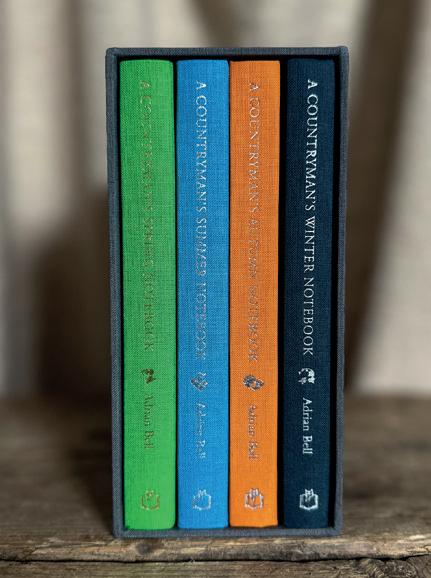
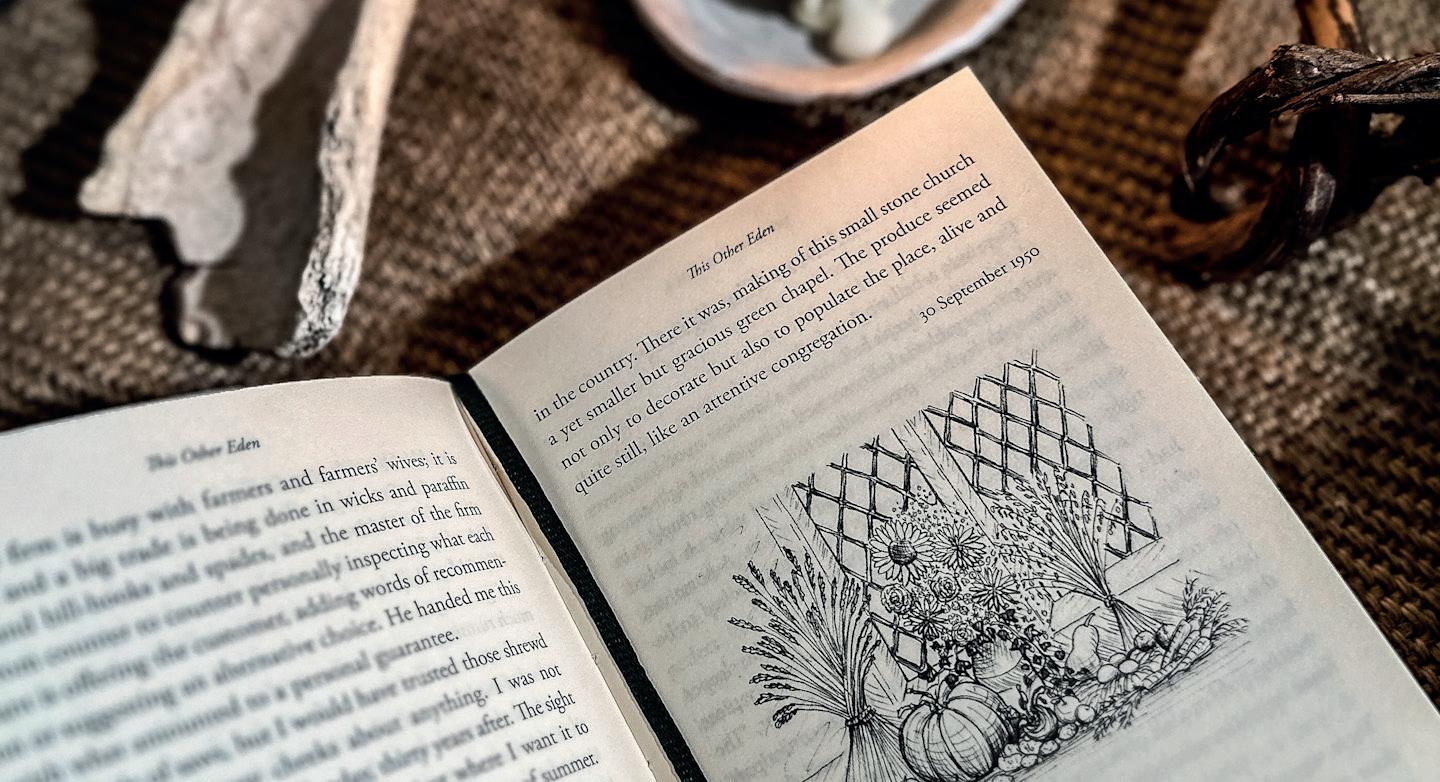
small (170 x 110mm) from £14 large (216 x 150mm) from £16
Our hardback cloth-bound notebooks come complete with coloured endpapers, silk head- and tailband, ribbon marker and gold blocking. There’s a choice of two sizes, small and large, and four colours: duck-egg blue, fawn, navy and maroon.
from £15 per set of 100 format: 110 x 80mm to affix: pritt stick or equivalent
The SF bookplate is produced on fine cream acid-free paper with space for you to write your own name. It’s a decorative and practical way to keep track of your favourite books, and the perfect gift for a bookish friend.
from £5.50 per pack of 8 a6 postcards
2 of each design packaged in a biodegradable clear wrap no envelopes
Vulpes series of illustrations, specially commissioned for the 20th anniversary year of Slightly Foxed magazine.
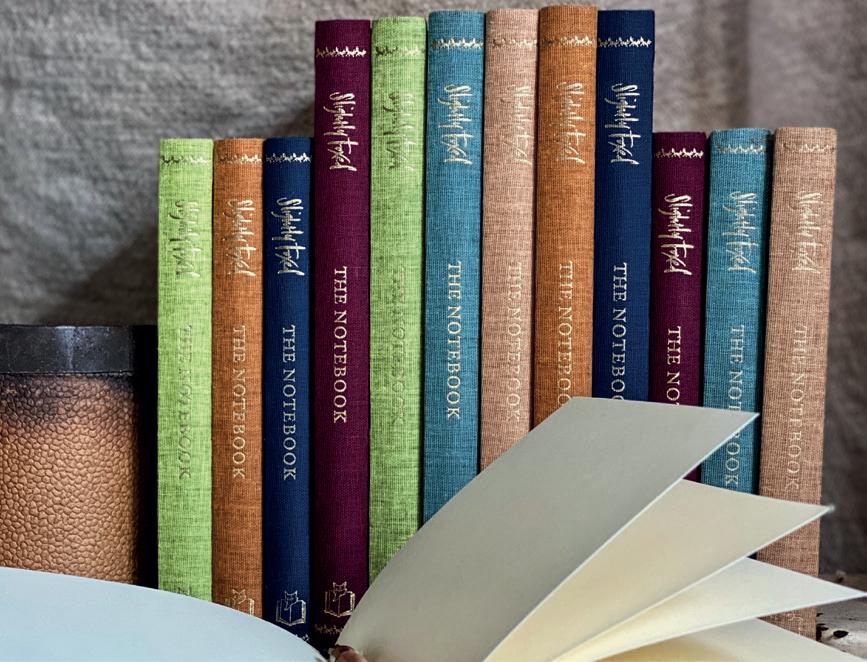
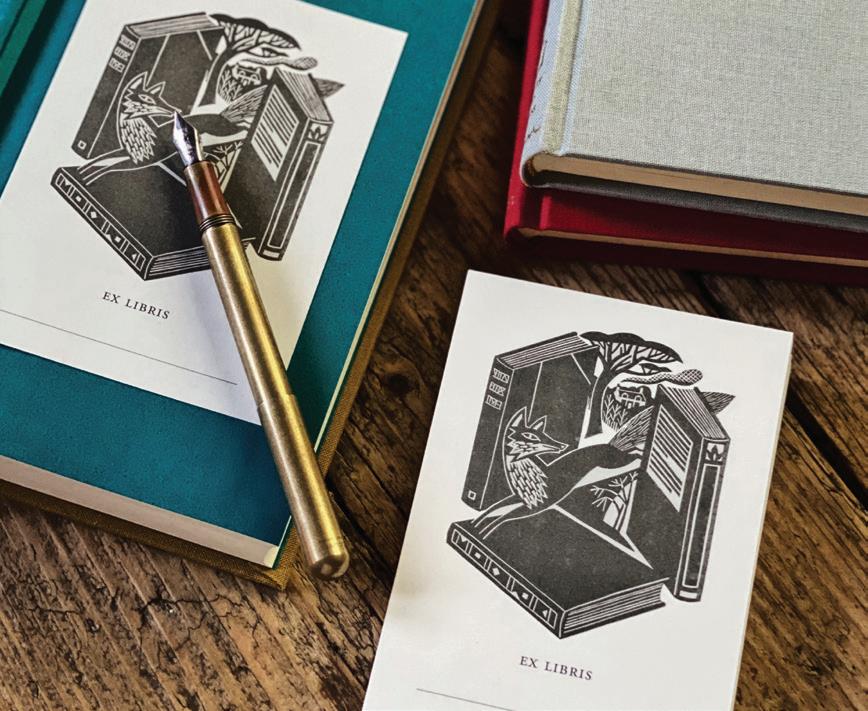

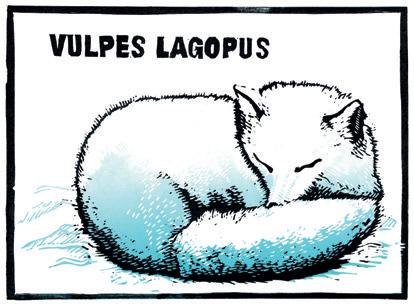
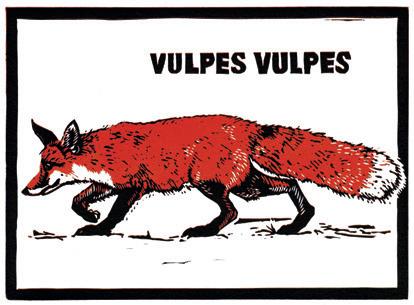
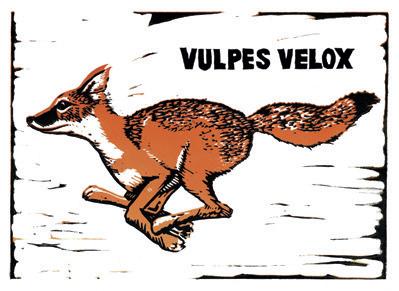
Slipcases from £15 • each holds 4 issues
Choose from dark grey or duck-egg blue cloth
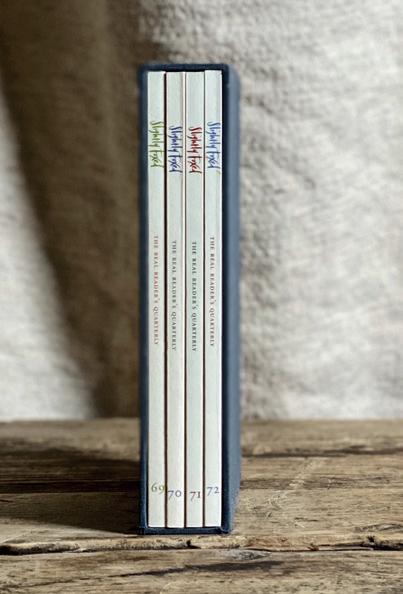
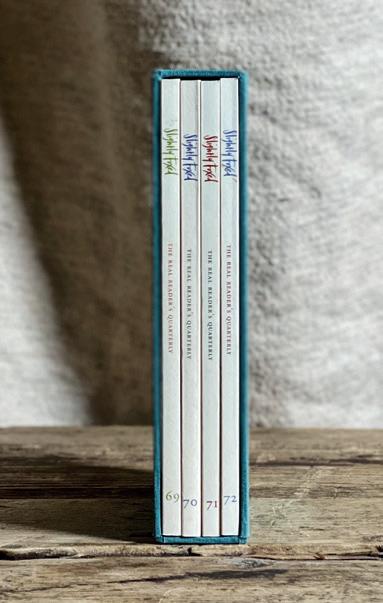
Jute Book Bag from £10
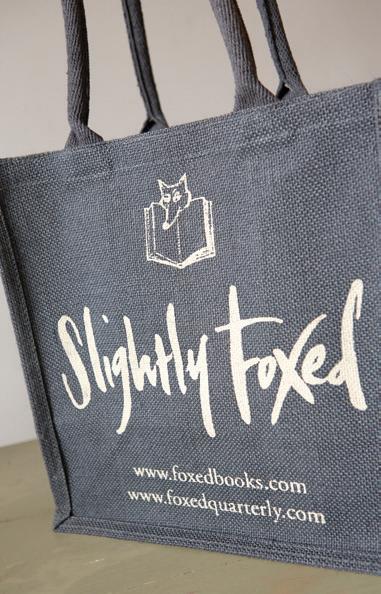
Cotton Tote Bag from £6

Sadly, due to GPSR regulations and customs tariffs, we are unable to ship bags to the EU or USA.
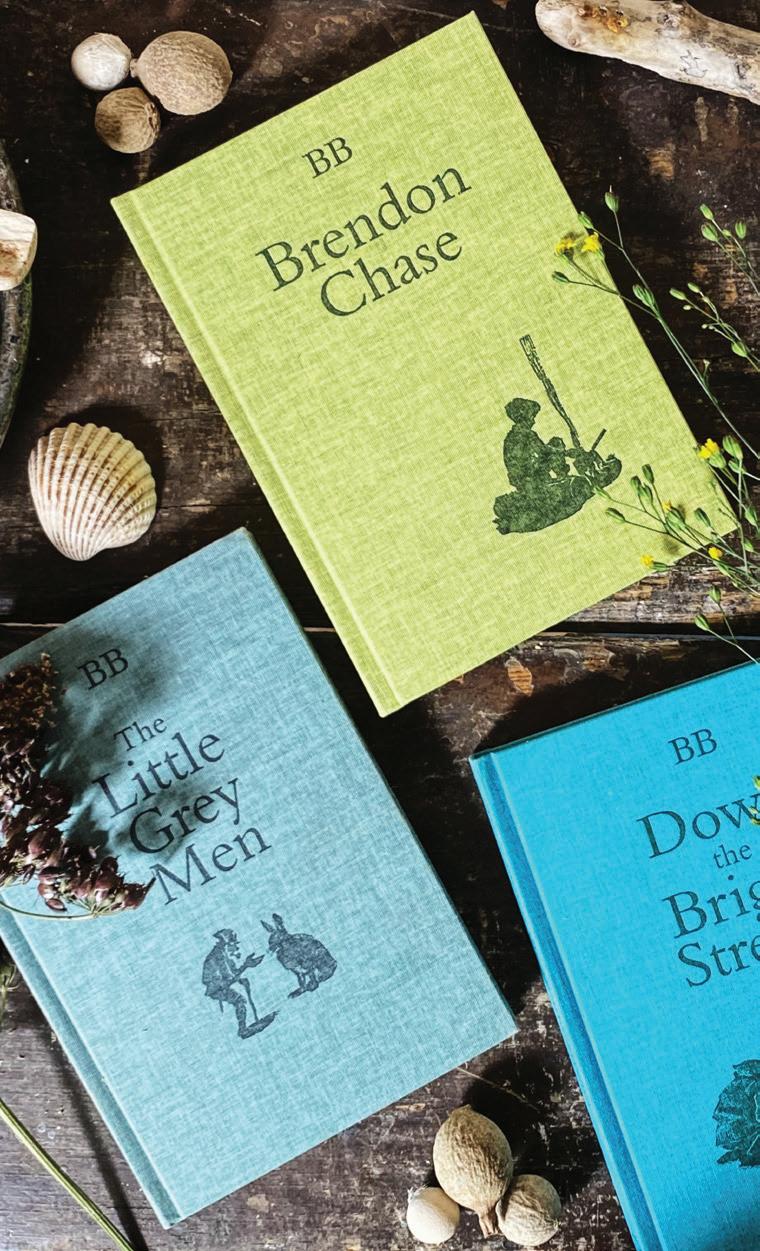

Ronald Welch’s fourteen Carey novels, written between 1954 and 1972, follow the fortunes of a Welsh land-owning family from their involvement in the Crusades to their service in the First World War. Grippingly plotted and scrupulously researched, together they join up the dots of English history in a remarkably vivid and human way. The plots are gripping, the characters believable and the research meticulous. Elegantly designed and handsomely bound, the Carey novels are not only great reads but also distinguished additions to any bookshelf. Many of these books have now sold out and are fetching high prices in the second-hand market but each can be read as a stand-alone adventure, so why not collect the last remaining titles in this limited edition series now?
Single titles: UK from £20; overseas from £22
Set of four available titles: UK from £61; overseas from £73 *save <£20
from £20
the wars of the roses (1455–85) • 232 pages
Set during the final years of the Wars of the Roses, Sun of York tells the story of Owen Lloyd, a young and impoverished aristocrat who is determined to reverse the family’s fortunes. Owen distinguishes himself in battle and contributes to the victory of the Yorkist King Edward IV. This is a brilliant coming-of-age novel which fits perfectly into the Carey series.
from £20
revolutionary france (1789–99) • 192 pages
With news of the revolution in France, the Careys are anxious about the fate of their relatives, the aristocratic d’Assailly family. Young Richard Carey, still a Cambridge student but already an outstanding swordsman, is sent secretly by his father Lord Aubigny on a mercy mission to bring them back to England. When he arrives at their château in Normandy Richard finds that the Marquis has already been arrested and he and his cousin Armand set out for Paris with a bold plan to spring him from the Abbaye prison. A complex tale of daring and disguise.
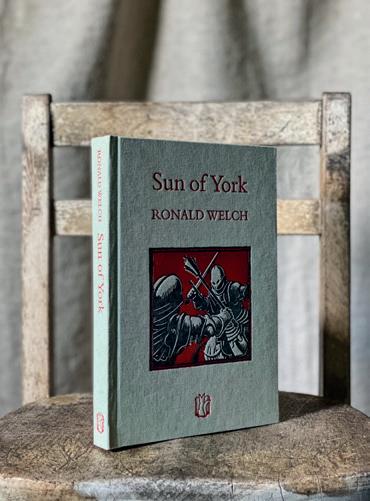
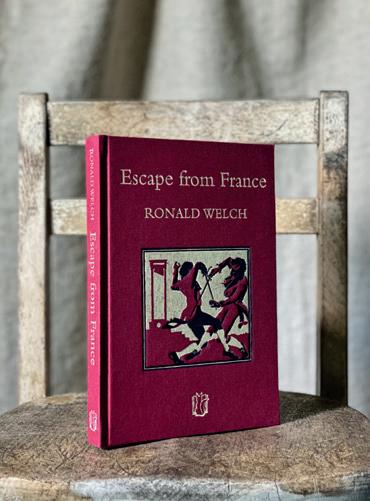
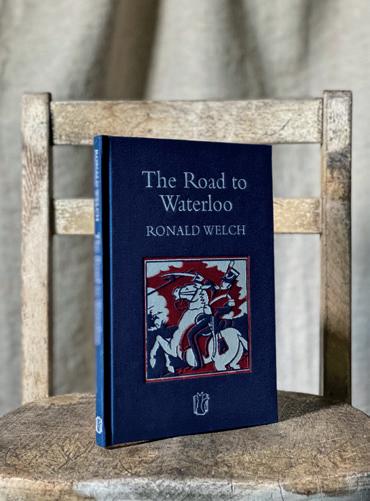
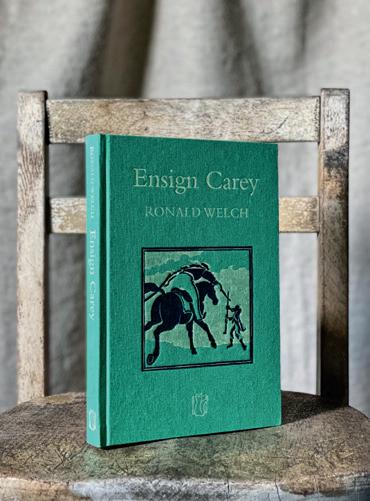
• from £18
napoleonic wars (1803–15) • 88 pages
The manuscript of The Road to Waterloo lay unread among Ronald Welch’s papers for more than 30 years after his death and has now been published, with specially commissioned illustrations, for the first time. It’s a thrilling picture of the build-up to Wellington’s victory at Waterloo and of a great army preparing for battle, and it has all the inimitable Welch ingredients – a young hero who grows up during the course of the book, entirely believable characters and a fast-paced plot brought alive by vivid historical detail.
• from £20
the indian mutiny (1857) • 200 pages
In the seedy and dangerous mid-nineteenth century London underworld, William Carey has a frightening encounter with George Hampton, a violent and unprincipled young man on the make. Banished from Cambridge as a result, in 1856 William travels to India, where his father has obtained a commission for him in the 84th Bengal Native Infantry, and his path again crosses that of Hampton. William is no saint, but when the Indian Mutiny breaks out among the native troops, he acts with generosity and courage.

‘Ronald Welch, a tank commander turned schoolmaster, is one of the 20th century’s most underrated children’s writers. Like Hilary Mantel, he understood that what makes a lost epoch stick in your mind is not the dates but the details . . . Ronald Welch’s novels will help your children fall in love with history.’ Iona Mclaren, Telegraph
Denys Watkins-Pitchford (1905‒90), who wrote under the pseudonym ‘BB’, was the author of more than sixty books for adults and children. Growing up in a rural Northamptonshire rectory and thought too delicate to go to school, BB roamed the countryside alone. His nostalgic evocation of the unwrecked England of his childhood, inhabited by the last survivors of an ancient and characterful tribe of small people who live in total harmony with their surroundings, is magical. BB was both a writer and an illustrator, and his charming original illustrations decorate these books. But above all he was a countryman, whose intimate and unsentimental knowledge of animals, birds and plants, as well as his gifts as a storyteller, make these books unique.
288 pages • illus. • from £20
Faced with the end of the holidays and the prospect of school, who hasn’t dreamt of running away to the woods to live in the wild? This is precisely what three boys do. At the end of the Easter holidays Robin, John and Harold Hensman escape their aunt’s house and go to live in an eleven-thousand-acre forest.
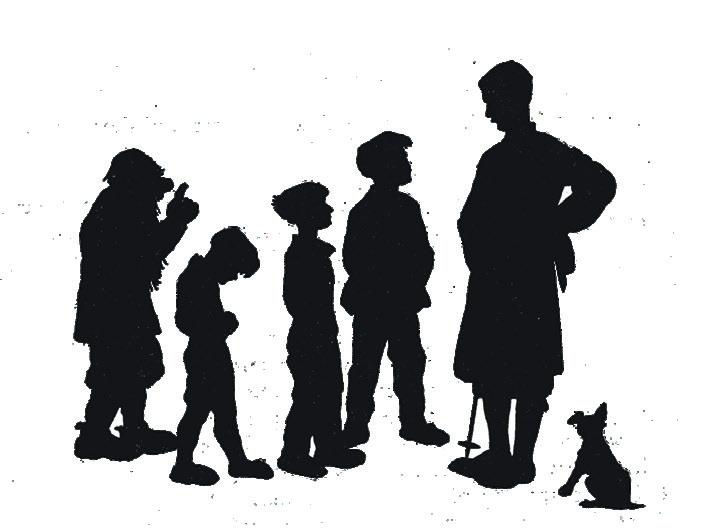
First published in 1944, Brendon Chase has a wonderful cast of pre-war English village characters, none of whom believe the boys will make it past teatime. Needless to say, the boys outwit them all with remarkable resourcefulness. This is one of the great children’s books, a bewitching blend of adventure, natural history, high jinks and skilled bushcraft.
224 & 220 pages • illus. • pair from £40
In The Little Grey Men, the last gnomes in England – Dodder, Baldmoney, Sneezewort and Cloudberry – are living contentedly in a burrow beneath the roots of an ancient oak tree on the banks of the Folly Brook. Contentedly, that is, until Cloudberry becomes obsessed with the idea of exploring the world beyond the riverbank, despite his brothers’ warnings. Two years later, Baldmoney and Sneezewort decide they must look for him, but Dodder at first refuses to go, and with heavy hearts the two set off upstream in their boat the Dragonfly. So begins a heroic quest to find their missing brother, before the four gnomes are finally reunited. In Down the Bright Stream, the four gnomes are woken from a long winter sleep to find their world collapsing. The brook beside which they have lived for five hundred years, and on which they and their animal friends depend, is being diverted to supply water for a new reservoir and is drying up. Human civilization is beginning to destroy the idyllic English countryside. Now the gnomes must set out once more on the Folly in search of a new home, sailing downstream towards the big river and the sea.
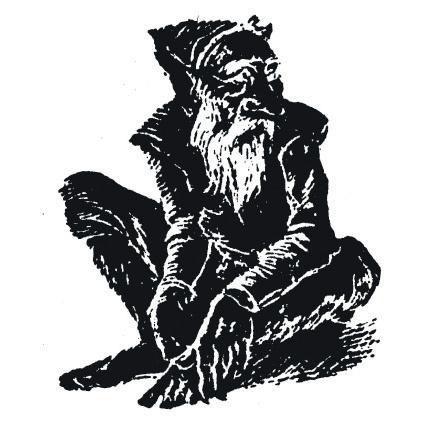
Set of three BB books: UK from £57; overseas from £63 *save <£9
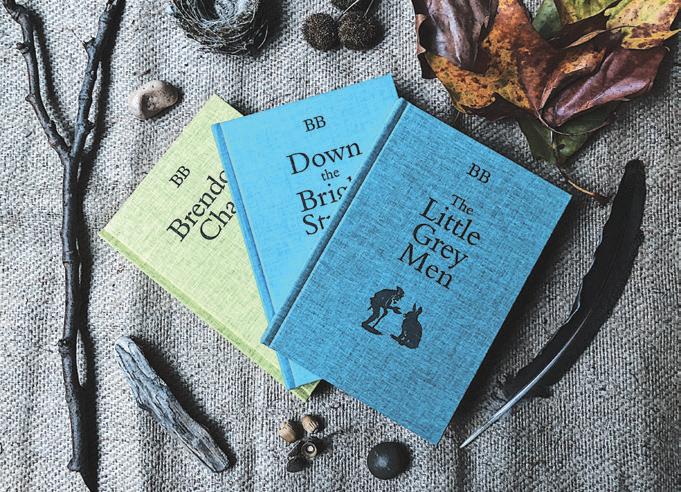
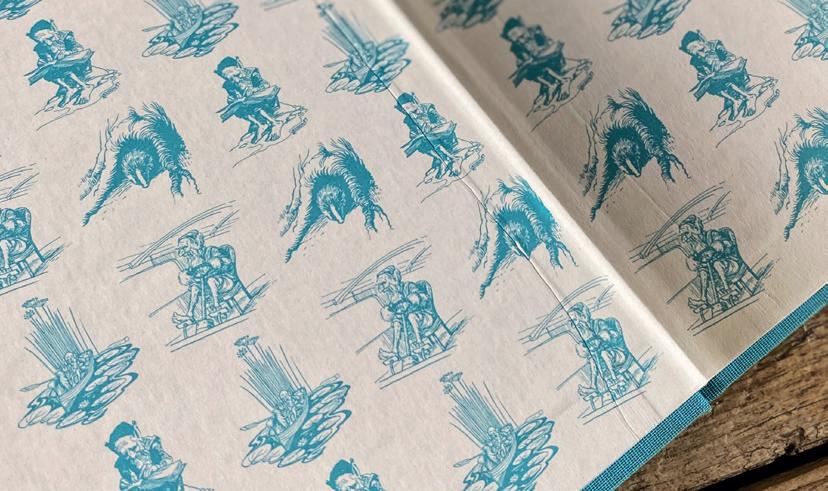
Rosemary Sutcliff (1920‒92) wrote three of her four great historical novels for children set during the last years of the Roman occupation of Britain – The Eagle of the Ninth, The Silver Branch and The Lantern Bearers (winner of the Carnegie Medal) – between 1954 and 1959, and Frontier Wolf, the fourth but chronological third, in 1980. The four books are only loosely interconnected, but together they portray the ebbing away of imperial power from Britain. The three final novels in this brilliant sequence – Dawn Wind, Sword Song and The Shield Ring –continue the story, forming a vivid panorama of the mysterious years from the departure of the Roman Legions, through the Dark Ages to the first decades of Norman rule.
Though Sutcliff was writing primarily for children, she never talks down to her readers, and adults too find these novels gripping. Her protagonists are flesh-and-blood people with understandable human dilemmas, and it’s they who drive the plots. All the books are based on historical fact, but it is Sutcliff’s imaginative brilliance that gives reality to a far-off period that left its mark on almost every aspect of British life.
Single titles: UK from £20; overseas from £22
Full set of seven titles: UK from £140; overseas from £154 *
248 pages • illus. *Only available as part of a full set As Marcus the young centurion arrives in Britain to take up his first command, he is haunted by the memory of his father and the 6,000 men of the Ninth Hispana Legion, who twelve years earlier had marched north of Hadrian’s Wall to quell an uprising and were never seen again. Seriously wounded soon after in an attack by hostile tribesmen, invalided out of the Roman Army and wondering what to do with his life, Marcus determines to make the hazardous journey north in a bid to discover the fate of the Ninth Legion, and in particular of the Roman eagle, the Legion’s standard and a possible rallying point for the northern tribes in their war against Rome. Sutcliff’s most famous book is a gripping adventure and a touching coming-of-age story, based on the real disappearance of the Ninth Legion around the year ad 117.
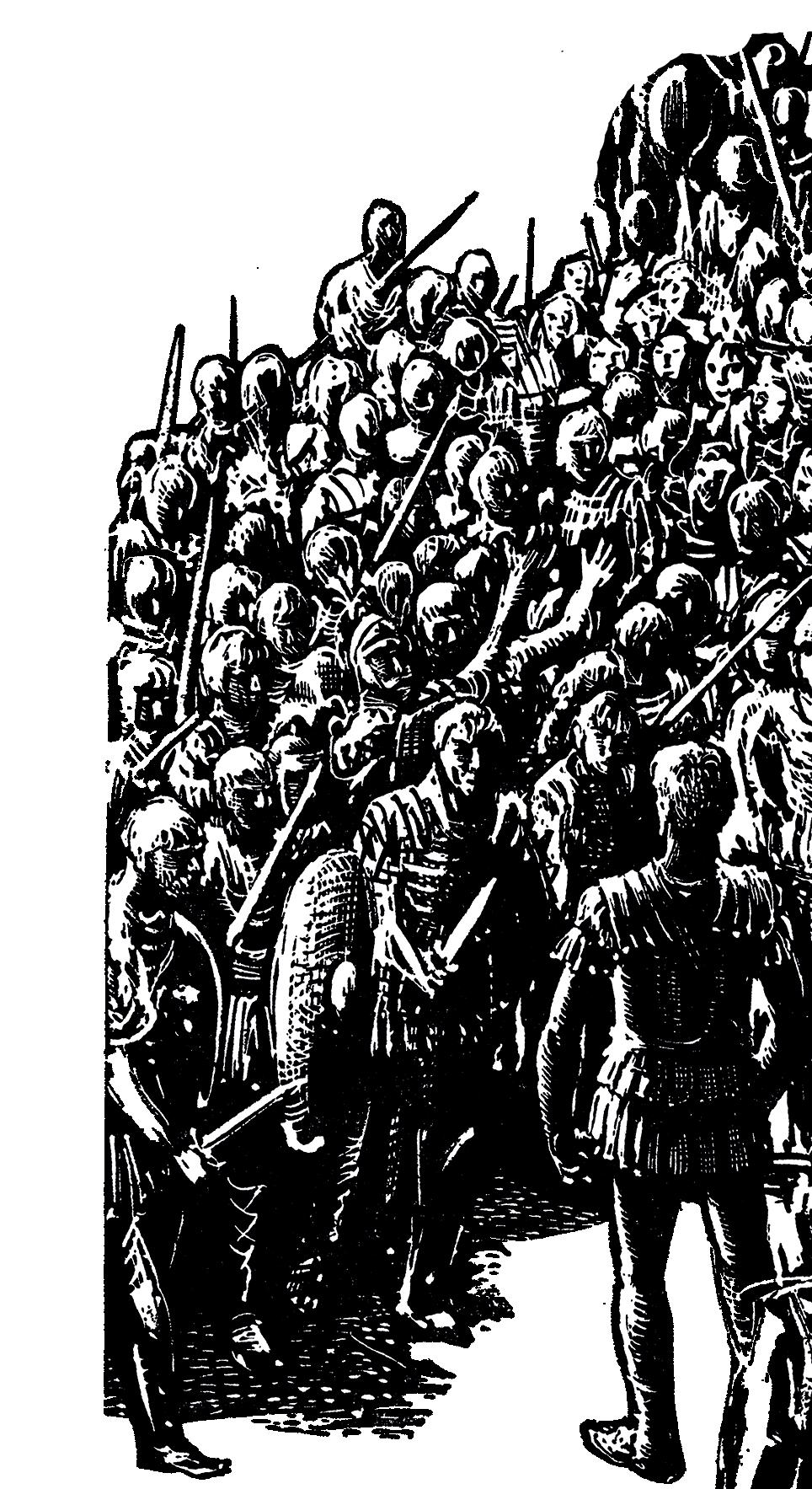
216 pages • illus. • from £20
Roman influence in Britain is waning. The Empire is increasingly threatened by hostile tribes along its borders, and divided by political struggles at home. Two distant cousins who have met by chance in Britain – Justin, a shy, newly qualified army surgeon, and Flavius, a young centurion – are caught up in the power struggles between Carausius, the charismatic Emperor of Britain, his cruel and ruthless treasurer, and the Emperor in Rome. Disgraced after their attempt to warn Carausius about a plot against him fails, the two go underground, rallying support for the legitimate Emperor and finally taking refuge at the home of their formidable great-aunt Honoria. Here they make an astonishing discovery which affects their future and links directly back to their ancestor Marcus and the disappearance of the Ninth Legion.
224 pages • from £20
After a disastrous misjudgement which cost the lives of half his men, Alexios, another young centurion and member of the Aquila family, is sent to take charge of a bleak Roman outpost on Hadrian’s Wall and the savage men who defend it, the Frontier Wolves of the title. Dealing with this notorious legion is literally a matter of life and death for Alexios, for a commander who alienates them is unlikely to survive. Frontier Wolf tells the story of how this flawed but likeable hero grows in stature, gradually gaining his legion’s respect and the co-operation of the surrounding tribes, and defending Rome as the threat from the North grows.
264 pages • illus. • from £20
The shadow of the approaching Dark Ages hangs over this tale. Rome’s legacy is finally decaying, the regular legions have been withdrawn, and Saxon raiding parties are invading the British countryside. As commander of a cavalry troop, young Aquila has been ordered to leave, but he has grown to love Britain and stays on, only to see his father’s farm torched by the Saxons, his father and the household servants murdered and his sister Flavia abducted. Aquila himself is captured and spends years as a slave to a Saxon clan, but as the darkness gathers over Britain, it only strengthens his determination to avenge his family and keep Roman values alive.
248 pages • illus. • from £20
Owain, the book’s teenage hero who has both Roman and British blood in his veins, is the sole survivor of a terrible battle with the Saxons. Wounded and hungry, and with only a great fighting dog for company, he makes for the old Roman city of Viroconium where, among the ruins, he meets another survivor, Regina, a young and terrified orphaned girl. Together they set off for the coast, planning to leave Britain for a British settlement in Gaul. On the journey Regina falls desperately ill and Owain

buys her safety with his own freedom, becoming a thrall in a Saxon household. But in the years that follow he never forgets Regina, and when he regains his freedom the two meet again.
228 pages • illus. • from £20
Sixteen-year-old Bjarni Sigurdson, a young Norwegian living in the Viking settlement of Rafnglas, is exiled for five years by the chief, Rafn Cedricson, for the hot-tempered murder of a priest, so breaking an oath Cedricson had sworn to his foster-brother to protect Christians within his lands. Bjarni joins a merchant ship sailing for Dublin from where, robbed of his possessions but with a new companion, a stray hound he calls Hugin, he embarks on a career as a mercenary in the wars between the clan chiefs in Ireland, Wales and the Scottish Isles. On Mull, he falls under the influence of the chief’s devoutly Christian mother Lady Aud, and after a chance meeting on a journey with her to the monastery on Iona, he is able to return and receive absolution from Rafn Cedricson for the breaking of his vow.
216 pages • illus. • from £20
England is now under Norman rule, but hidden high among the Cumbrian fells is one last Viking stronghold. Into it comes the five-year-old Saxon girl Frytha, saved by her father’s shepherd Grim after her family farm has been torched and her family murdered by the Normans. Here she meets another orphan, Bjorn, and over the years the two become inseparable. When William the Conqueror’s son William II marches north through Lakeland to confront the Scots, the Norsemen send a peace envoy, who is cruelly tortured and murdered by the Normans. It’s clear William is determined to take this final tactical outpost, but Bjorn, disguised as a travelling harper and secretly accompanied by Frytha, enters the enemy camp and after a terrifying ordeal brings back vital information which gives the advantage to the Norsemen.
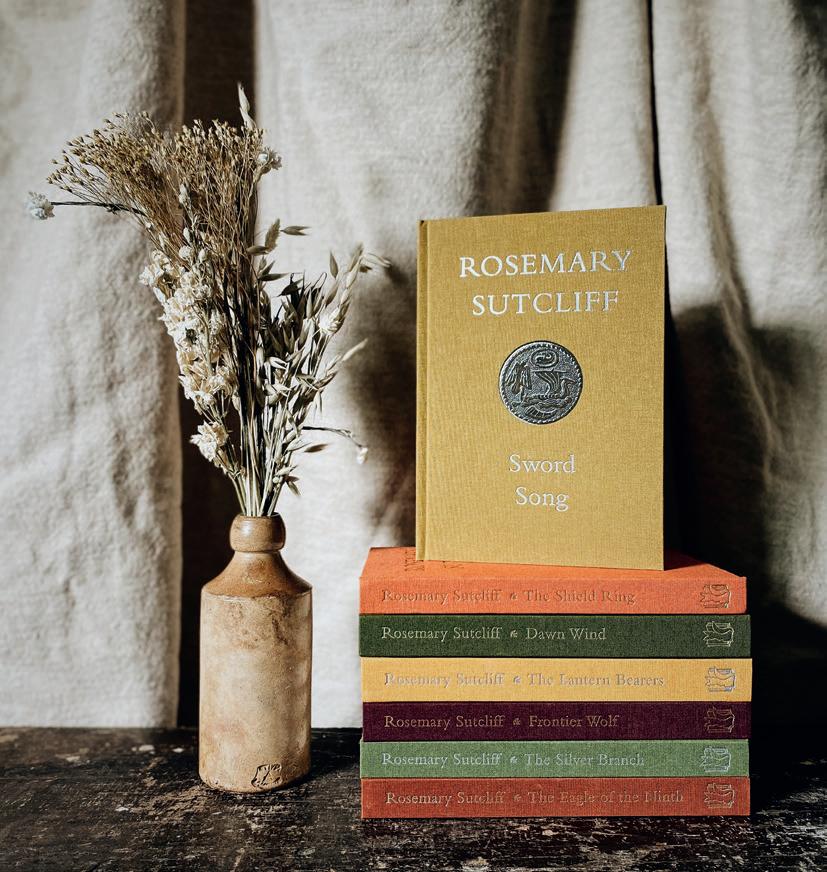

NB This list only contains in-print books featured in this issue. For a full bibliography, please see the issue or visit the website. For second-hand books, please contact the office. For books published by Slightly Foxed, please see the New & Forthcoming section on pp. 4–6.
T. H. White, The Once and Future King
harpercollins • pb • 864 pages • from £14.99 • article by sam leith
Peter Davidson, The Idea of North reaktion books • pb • 304 pages • from £13.99 • article by jonathan law
Rosamond Lehmann, The Weather in the Streets virago • pb • 384 pages • from £12.99 • article by fiona mckenzie johnston
Adam Thorpe, Ulverton vintage • pb • 432 pages • from £11.99 • article by ned vessey
P. D. James, Cover Her Face faber • pb • 288 pages • from £11.99 • article by daisy hay
Gerard Manley Hopkins, The Major Works, ed. Catherine Phillips oxford university press • pb • 368 pages • from £12.99 • article by maggie fergusson
Peter Ross, Steeple Chasing headline • pb • 432 pages • from £12.99 • article by william davies
Nina Stibbe, Love, Nina: Despatches from Family Life penguin • pb • 352 pages • from £12.99 • article by jo rodgers
Benjamin Labatut, When We Cease to Understand the World pushkin press • pb • 192 pages • from £11.99 • article by bryan appleyard
John Lanchester, The Debt to Pleasure picador • pb • 240 pages • from £11.99 • article by laurie graham
John Braine, Room at the Top arrow books • pb • 240 pages • from £11.99 • article by anthony wells
Eva Ibbotston, The Secret Countess picador • pb • 352 pages • from £11.99 • article by emily schroeder
A. J. Liebling, Between Meals: An Appetite for Paris penguin • pb • 176 pages • from £12.99 • article by justin marozzi
A small selection of new editions, latest releases, seasonal treats and other recommended reading from fellow publishers. There are many more books on our website and the office can order in most new books so, if there’s something you’re looking for, do get in touch.
Salman Rushdie, The Eleventh Hour vintage • hb • 272 pages • from £20.99
Two quarrelsome old men in Chennai, India, experience private tragedy against the backdrop of national calamity. In an English university college, an undead academic asks a lonely student to avenge his former tormentor. Through five dazzling works of fiction, The Eleventh Hour ponders life and death, legacy and identity with the penetrating insight and boundless imagination that have made Salman Rushdie one of the most celebrated writers of our time.
Andreï Makine, A Life’s Music hodder & stoughton • pb • 112 pages • from £12.99
In a snowbound railway station deep in the Soviet Union, a stranded passenger comes across an old man playing the piano in the dark. Once on the train to Moscow he begins to tell his story: a tale of loss, love and survival that movingly illustrates the strength of human resilience.
Natalie Haynes, No Friend to this House
pan macmillan • hb • 384 pages • from £22
‘This is what no one tells you, in the songs sung about Jason and the Argo. This part of his quest has been forgotten, by everyone but me.’ In this extraordinary reimagining of the myth of Medea, Jason and his Argonauts set sail on a journey filled with danger, for him and everyone he meets. Medea – priestess, witch and daughter of a brutal king – has the power to save his life. Will she betray her family and her home, and what will she demand in return?
William Boyd, The Predicament penguin • hb • 272 pages • from £22
Gabriel Dax, travel writer and accidental spy, is back in the shadows, sent to Guatemala under the guise of covering a tinderbox presidential election. As political turmoil erupts, Gabriel’s reluctant involvement deepens. His escape leads him to West Berlin, and in a race against time, Gabriel must navigate deceit and danger as he uncovers a chilling plot.
Catherine Merridale, Moscow Underground
harpercollins • hb • 336 pages • from £18.99
Moscow 1934 and the city’s glittering new subway is under construction at last. Though Russia’s leaders want to build a glorious Soviet capital, what holds them in a fatal grip is history: old mud and bones. Anton Belkin is an Investigator at the Procuracy, a sensitive job at a dangerous moment on the road to the Show Trials. Deep underground, Anton finds a priceless secret that could unlock the future but links him to a vicious fight for power. Moscow Underground is a sweeping novel of life, death and politics in the quicksand world of Stalin’s tyranny.
Alejandro Zambra, Childish Literature
fitzcarraldo editions • pb • 216 pages • from £14.99
Written in a ‘state of attachment’, or ‘under the influence’ of fatherhood, Childish Literature is an eclectic guide for novice parents. In a chronicle of parenthood that is also a work of fiction, Alejandro Zambra shows how children shield adults from despondency, self-absorption and the tyrannies of chronological time.
Kiran Desai, The Loneliness of Sonia and Sunny
hamish hamilton • pb • 688 pages • from £27
Twenty years after winning the Booker Prize for The Inheritance of Loss, Kiran Desai is back with this sweeping love story of two young people, abroad in the United States and at home in India, navigating the many forces that shape their lives: country, class, race, history, and the complicated bonds that link one generation to the next.
Raymond Briggs, The Strange House
manderley press • pb • 176 pages • from £21.99 • illus.
From one of the nation’s most beloved authors and the creator of The Snowman comes a brand-new edition of two forgotten classics. Featuring original illustrations by Raymond Briggs, The Strange House follows childhood friends Tim and Gerry, as they find themselves discovering abandoned houses, mysterious tunnels and ghostly figures amidst the rubble of post-war Wimbledon.
Penelope Farmer, Charlotte Sometimes vintage • pb • 256 pages • from £9.99
Charlotte Makepeace’s first day at boarding school is a bewildering blur of unfamiliar faces, timetables, rules and lists. All the other girls know the routine – and each other. No one invites her into their exclusive circles of whispers and giggles. But on Charlotte’s very first night something mysterious starts to happen. She wakes up in the same bed, in the same dormitory, in the same school. But something has changed. Somehow Charlotte has slipped forty years back in time . . .
harpercollins • pb • 48 pages • from £9.99
Rene’s dreams have finally come true! She’s opened a café beside an enchanted wood, and with the help of a newfound waiter, Glumfoot, she is ready to serve the finest cuisine. But the locals seem to favour a most peculiar palette. Join Rene and Glumfoot in this incredible other-worldly story full of magical humour, mythical creatures and culinary curiosities.
virago • hb • 176 pages • from £11.99 • illus. peter bailey
In this captivating collection of stories by the author of Ballet Shoes, there are auditions on stage and antics on ice, trips to the pantomime and holiday adventures. Charming, heartwarming and funny, this collection will bring joy to readers of all ages.
A. A. Milne, Winnie-the-Pooh – The 100 Year Anniversary Collection
harpercollins • pb • from £10.99 per title
Handsome celebratory editions of A. A. Milne’s timeless stories from Hundred Acre Wood, decorated with E. H. Shepard’s original artwork. The collection includes: Winnie-the-Pooh; The House at Pooh Corner; When We Were Very Young; Now We Are Six; Return to the Hundred Acre Wood; The Best Bear in All the World; Once There Was a Bear; Tales from the Forest and Winter in the Wood.
harpercollins • pb • 112 pages • from £16.99
A behind-the-scenes look at the miniature world of Brambly Hedge, with never-seen-before stories, sketches, photos and previously unpublished work, perfect for fans young and old.
Suetonius, The Lives of the
penguin • hb • 448 pages • from £27
trans. Tom Holland
A masterful new translation, by award-winning historian Tom Holland, of Suetonius’ renowned biography of the twelve Caesars. Placing each Caesar in the context of the generations that had gone before, and connecting personality with policy, we are shown their tastes, their foibles, their eccentricities and their bedrooms. The Lives of the Caesars is an astonishing, immersive experience of a time and culture at once familiar and utterly alien to our own.
Meehan,
thames & hudson • hb • 320 pages • from £42 • illus.
Slow Looking takes readers on a meditative journey exploring our deep-rooted connection between art and nature, from Georgia O’Keeffe’s seashells to Van Gogh’s olive trees and ancient Egyptian carvings. With each pairing, Meehan encourages us to notice more, look closer and find calm in the beauty and power of the natural world, from volcanoes and tempestuous seas to shimmering forests and shooting stars.
reaktion books • hb • 320 pages • from £27 • illus.
The Green Fuse explores our deep-rooted impulse to create gardens, examining it through the other arts – painting, music, literature and theatre – and contemplating their significance. Blending lyrical reflections with research, Peter Dale offers an unusually wide-ranging and thoughtful perspective on gardens and why we make them.
Golding: The Faber
faber • hb • 592 pages • from £62
, ed. Tim Kendall
In 1953, William Golding’s novel Lord of the Flies was rescued from a ‘slush pile’ of unsolicited manuscripts by Charles Monteith, a new young editor at the publishing house Faber & Faber. It went on to sell over 25 million copies. Over the next forty years Monteith worked closely with
Golding on every one of his novels. In this beautifully produced volume, Tim Kendall draws on both public and private archives to reveal the relationship between one of the greatest novelists of the twentieth century and his publisher.
weidenfeld & nicolson • pb • 320 pages • from £11.99
Father’s Day, 2005. Just after nightfall, a father drove his three young sons back to their mother, his ex-wife. On that dark country road, the old white car swerved off the highway and plunged into a dam. The father freed himself and swam to the bank, but the car sank to the bottom and the children drowned. Helen Garner charts the court case that followed, examining just what we are capable of and how fiercely we hide it from ourselves.
Berners-Lee,
pan macmillan • hb • 400 pages • from £27 Born in the same year as Bill Gates and Steve Jobs, Berners-Lee shared his invention, the World Wide Web, for no commercial reward. Its widespread adoption changed everything. Through the web, we live, work, dream and connect. In this intimate memoir, Berners-Lee tells the story of his iconic invention, exploring how it launched a new era of creativity and collaboration while unleashing a commercial race that today imperils democracies and polarizes public debate.
the armchair traveller • pb • 220 pages • from £11.99 • illus.
Samuel Pepys walked London for miles. The 2½ miles to Whitehall from his house near the Tower of London was accomplished on an almost daily basis, and so many of his professional conversations took place while walking that the streets became for him an alternative to his office. Full of fascinating details and written with extraordinary sensitivity, Walking Pepys’s London is an unmissable exploration into the places that made the greatest English diarist of all time.
doubleday • hb • 160 pages • from £14.99
At night the senses become reordered. Hearing becomes privileged over vision, and we edge forward arms outstretched, feeling our way through the inky blackness. In this enchanting follow-up to Nightwalking, Lewis-Stempel once again ventures out into the dark and shows us why the night is precious, and what it is to be human in the dark. When the curtain of night falls, a spectacle begins. That of bio-luminescence, of boxing hares, and wheat fields shimmering in the moonlight.
Mary Chamberlain, Fenwomen virago • pb • 256 pages • from £12.99
Mary Coe recalls summers spent gleaning in the fields, laudanum-soothed babies strapped to their mothers’ backs. Eighty-six-year-old Sybil Hayhoe looks back with pride at her years in service, while the village postwoman is sharply aware of her unequal wages. Girls aspire to be housewives, hairdressers or nurses, except Fiona, who dreams of training horses. Told through the voices of ordinary women, Mary Chamberlain’s portrait of an isolated village in the Cambridgeshire Fens remains as vital and thought-provoking as on its groundbreaking publication in 1975.
Alison Weir, Queens at War vintage • hb • 480 pages • from £27
The fifteenth century was a turbulent age: the Hundred Years’ War between England and France, and the Wars of the Roses dominated the lives of people both inside and out of the royal courts. In this final volume of her ground-breaking series, Alison Weir uncovers the stories of Joan of Navarre, Katherine of Valois, Margaret of Anjou, Elizabeth Wydeville and Anne Neville – the formidable queens caught up in wars that changed the course of their lives, and the course of history.
hodder & stoughton • hb • 336 pages • from £22
A poignant and joyful collection of reflections from one of the world’s most beloved authors. Here, published to celebrate Michael’s 82nd birthday, are his thoughts on nature, childhood, writing, peace and war, and getting older. Some are deeply personal, some political, others in between. And woven in amongst them you will find a play, a poem or two, and even a few stories.
harpercollins • hb • 336 pages • from £27
Jung Chang’s Wild Swans was a book that defined a generation – the story of ‘three daughters of China’: Jung, her mother and her grandmother and their lives during a century of revolution. With vivid flashbacks to her family’s experience in communist China, Fly, Wild Swans offers an extraordinary account of Jung’s research into the genocidal regime of Mao Tse-Tung, the many fictions she uncovered and the political consequences of publishing her subsequent biography.
penguin • hb • 416 pages • from £27
Malcolm Gaskill knew two things about his great-uncle Ralph’s wartime adventures: he’d been a prisoner in Italy, and he’d cut his way out of a train with a knife and fork. Apart from that, he’d faded into family folklore, lost to view. Until one hot afternoon in an English country garden, a chance conversation set Gaskill on his uncle’s trail . . .
vintage • hb • 368 pages • from £27
From the Isles of Scilly to the Scottish Highlands, James Fox travels the length of Britain to seek out the country’s last great craftspeople. Stepping inside the workshops of blacksmiths, wheelwrights and coopers, we glimpse not only our past but another way of life: one that is not yet lost and might still shape our future.
Wilson
octopus • hb • 176 pages • from £27 • illus.
From the award-winning Ginger Pig butchers, here are all the recipes you need for the most important meal of the year – plus all the other get-togethers of the festive season. In addition to
delicious dishes there’s a wealth of helpful advice, from how to stuff a bird to the art of building a festive cheese board. Packed with recipes for every possible Christmas, whether you’re feeding a crowd or cooking for a few, this is the ultimate culinary guide for a stress-free, luxurious Christmas.
Flora Shedden, Winter in the Highlands
quadrille • hb • 224 pages • from £28 • illus.
Banish the winter blues, embrace the stark beauty of the colder months and step into an invitingly warm world of comfort and culinary delight. In her eagerly anticipated fourth cookbook, Flora Shedden invites readers on a joyous, heart-warming journey through the enchanting winter season in Scotland, celebrating the region’s rich culinary heritage and cherished festive traditions.
Mark Diacono, Abundance: Eating and Living with the Seasons
quadrille • hb • 288 pages • from £32 • illus.
Abundance is a record of one man’s year living on the south-west coast of England as he quietly contemplates life, nature and his next meal. With over 80 recipes, including early summer shakshuka, onion seed and oregano flower focaccia, fig leaf and olive oil ice cream and a mulberry martini, there are dishes to inspire and satisfy every week as the year unfolds before you.
Pam Brunton, Between Two Waters: Heritage, Landscape & the Modern Cook canongate • hb • 304 pages • from £20 • illus.
When world-class chef Pam first opened Inver, her restaurant on the shores of Loch Fyne, she set out to discover what makes ‘modern Scottish food’. Part memoir, part manifesto on the future of feeding the world, this book traces Pam’s journey to answer that question and in doing so reveals what we can all gather from our culinary heritage.
Lia Leendertz, The Almanac: A Seasonal Guide to 2026
octopus • hb • 288 pages • from £14.99 • illus.
Reconnect with the seasons in Britain and Ireland with this month-by-month guide to the world around us including tide tables, sunrises and moon phases; wildlife and folklore; seasonal recipes and more. The Almanac gives you the tools and inspiration you need to celebrate, mark and appreciate each month of the year in your own particular way.
Christmas Tree: Ten Poems of Wishes and Lights, ed. Di Slaney candlestick press • pb • 28 pages • from £8.95 • illus.
Christmas Tree captures the heart of a much-loved festive tradition, so symbolic of spending time with loved ones. There are poems about choosing the right tree and the wonders of winter, and beautiful evocations of companionship beside the fire. ‘Instead of a Card’ poetry pamphlets make perfect presents – unusual and enjoyable. Each comes with an envelope and bookmark.
India Knight, Home penguin • hb • 288 pages • from £22 • illus.
Why are we obsessed with our homes? Why do we sigh with contentment when we open our front doors, and why is that so central to our wellbeing? Whether it’s owned or rented, big or tiny, rural or urban, singleton pad or rammed with children, Home is a testament to real homes, to the kitchen junk drawer, to turning off the big light, and to the power of a good night’s sleep.
Diana Henry, Around the Table: 52 Essays on Food & Life
octopus • hb • 320 pages • from £22 • illus.
For Diana’s many admirers, her evocative writing about places, people and food brings just as much pleasure as her delicious recipes. Around the Table is a beautiful collection of some of her very best essays, handpicked from more than two decades of her beloved cookbooks. Moving, funny and incisive, together these pieces form a memoir through food.
Slightly Foxed Issue 88 • winter ’25 • from £14
Laurie Graham relishes a story of mushrooms and murder • Sam Leith pays homage to The Once and Future King • Maggie Fergusson is comforted by Gerard Manley Hopkins • Bryan Appleyard finds hope in a terrifying novel • Jo Rodgers has fun with the North London literati • Justin Marozzi discovers An Appetite for Paris • Anthony Wells discovers there’s Room at the Top • Daisy Hay admits she’s in love with Adam Dalgliesh, and much more besides.
A Taste of Slightly Foxed • from £30 *save <£4.50
The combination of the winter issue of the quarterly magazine and our cloth-bound hardback edition of Les Girls makes an ideal introduction to Slightly Foxed.
1-Year Subscription & Back Issue Bundle • from £136 *save £26
A year of good reading, 4 recent back issues and 2 handsome grey slipcases.
Back Issues 1–87 • single copies from £15
The Slightly Foxed archive is a treasure chest – over twenty years’ worth of entertaining and original reading recommendations, good humour and good writing.
Completely Foxed • from £1,298 *save <£440
The ultimate present for a bibliophile, or for oneself. Invest in a set of Slightly Foxed back issues 1–88 (2004–2025) along with 21 smart grey or duck-egg blue slipcases in which to keep them.
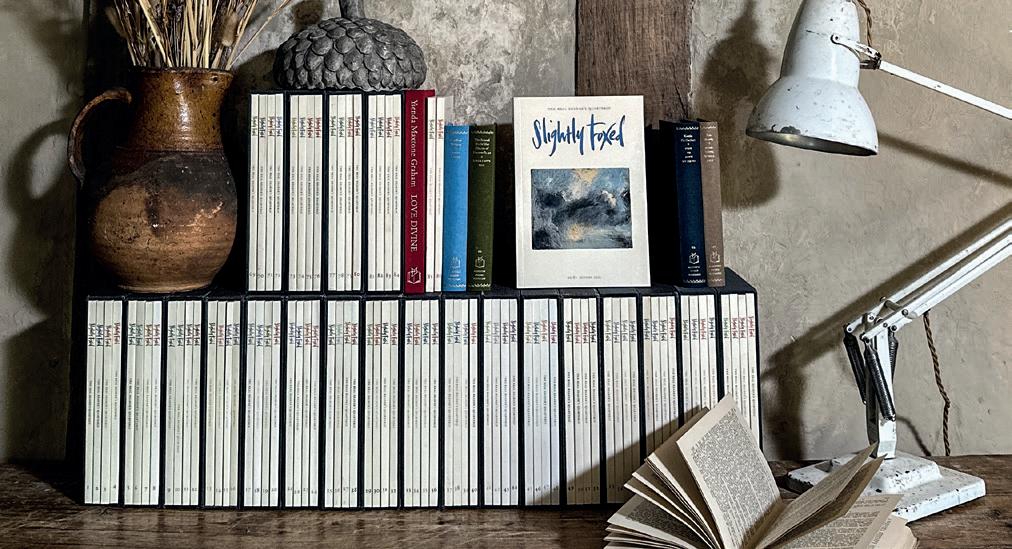
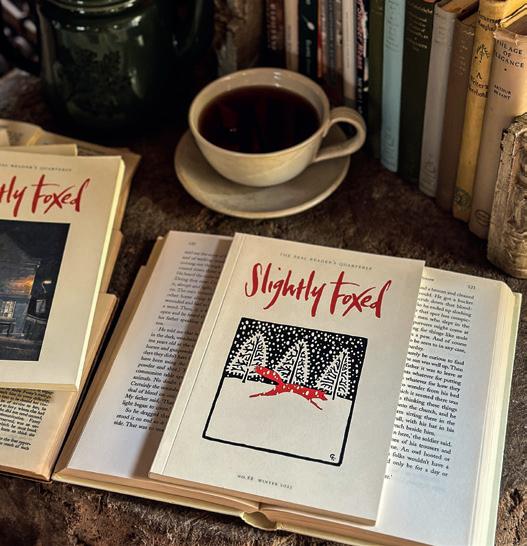
Illustrating Life • set from £72 *save <£12
Period Piece; The Young Ardizzone; When I Was a Little Boy; A Boy at the Hogarth Press
Tales of School Days • set from £72 *save <£12
A Classical Education; Boy; Terms & Conditions; Mr Tibbits’s Catholic School
The World at War • set from £90 *save <£15
True to Both My Selves ; Sword of Bone ; Going Solo ; I Was a Stranger ; Life in Our Hands
Writing Life • set from £90 *save <£15
Basil Street Blues; Ghosting; Hons and Rebels; Boy; Still Life
Women and War • set from £72 *save <£12
The Past Is Myself ; To War with Whitaker; Nella Last’s War; True to Both My Selves
Last Call Bundle • set from £72 *save <£12
Basil Street Blues; The Secret Orchard . . .; When I Was a Little Boy; Something Wholesale
Collectors’ Bundle • 30 volumes from £570 *save <£90 • All available SF Editions
Library Bundle • 50 volumes from £950 *save <£150
All available SF and Plain Editions
Starter Library • 14 volumes • from £264 *save <£42 • All available Cubs Editions
Slightly Foxed Editions Subscription • from £20 per quarter
Receive the same hand-numbered copy of each new limited SF Edition on publication
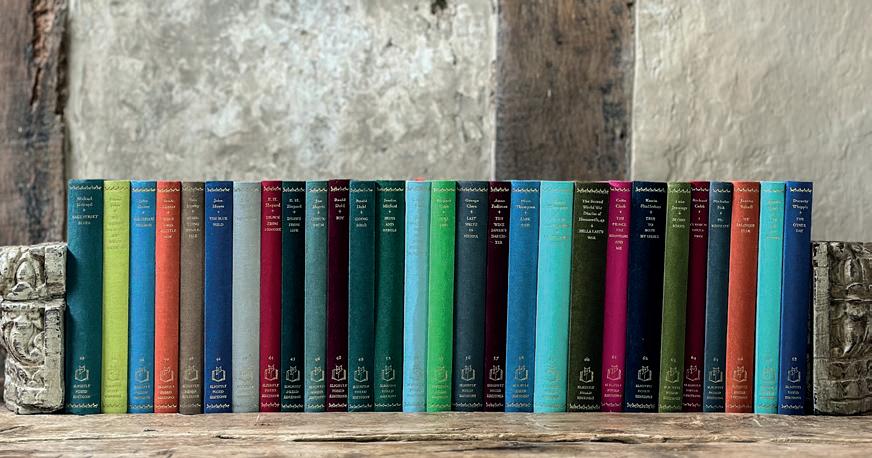
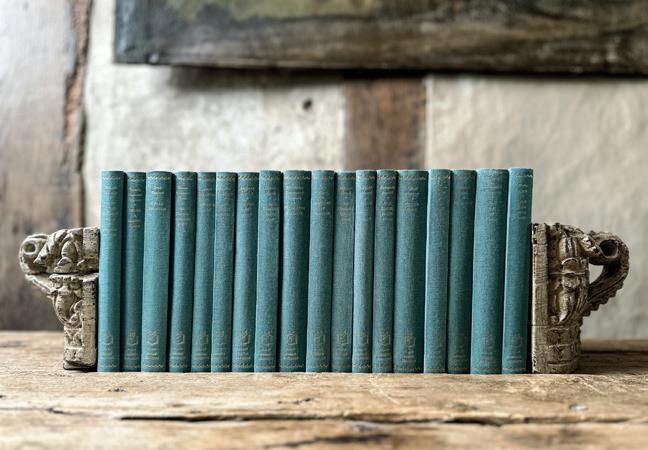
For a full list of bundles, back issues, offers and many more books, please visit the website: www.foxedquarterly.com
Two new gloriously seasonal and bookish designs by Ella Balaam. Available in packs of 10 of each single design or a mixed pack of 10 comprising 5 of each design.
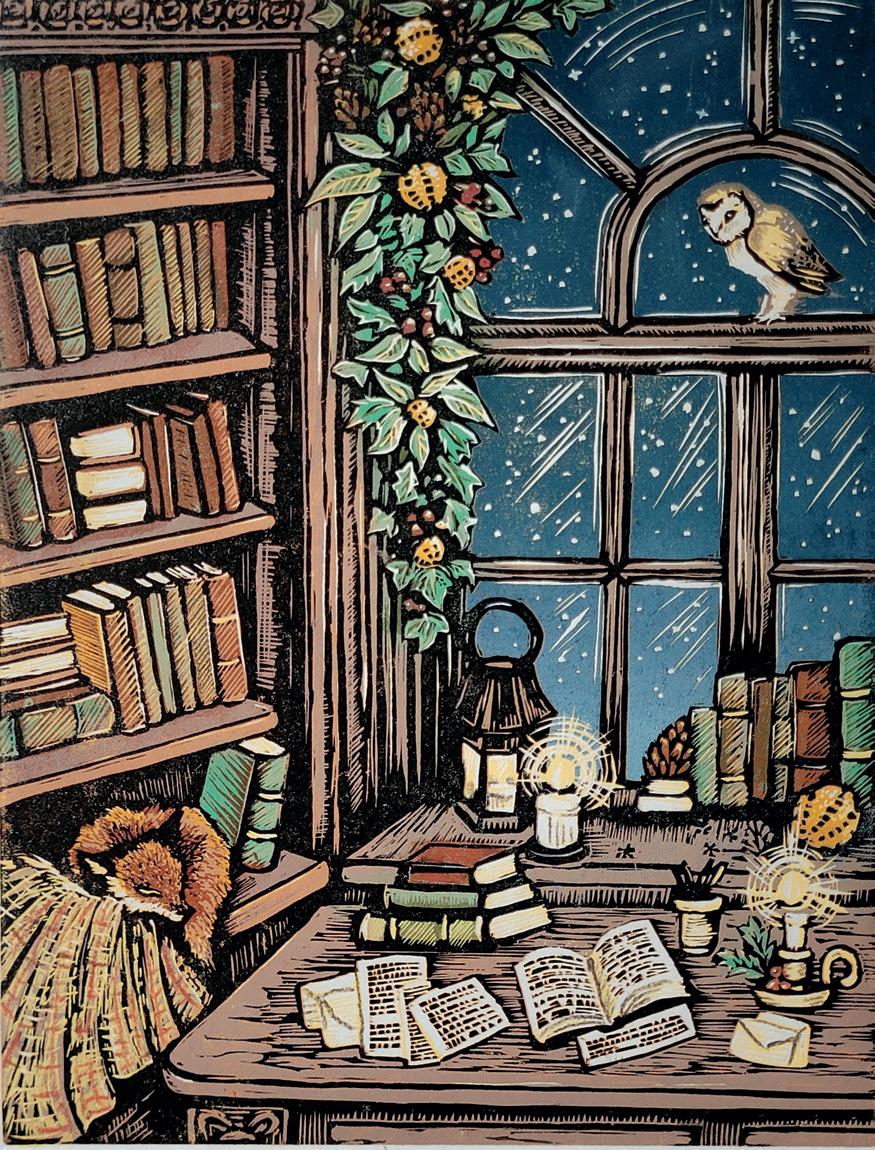
SF Subscriber Prices: UK £12.50; overseas from £13.50 inc. p&p
Non-Subscriber Prices: UK £13.50; overseas from £14.50 inc. p&p
Packs include white envelopes.
Please note that greetings cards being sent to the US will be subject to a 10% customs tariff.
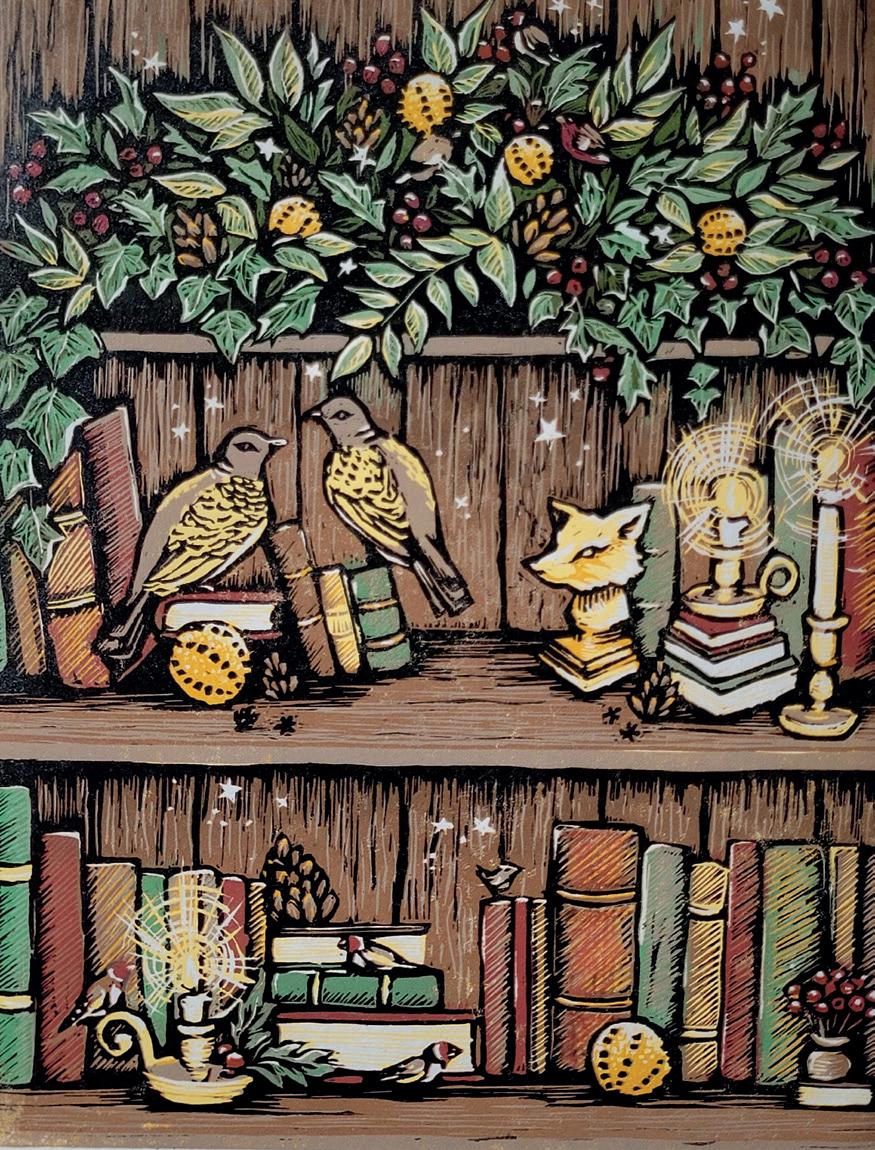
Our popular range of convivial cards, coloured in the Victorian manner, are available in packs of 10 of each design or a mixed pack of 10 comprising 2 of each design.
SF Subscriber Prices: UK £12.50; overseas from £13.50 inc. p&p
Non-Subscriber Prices UK £13.50; overseas from £14.50 inc. p&p
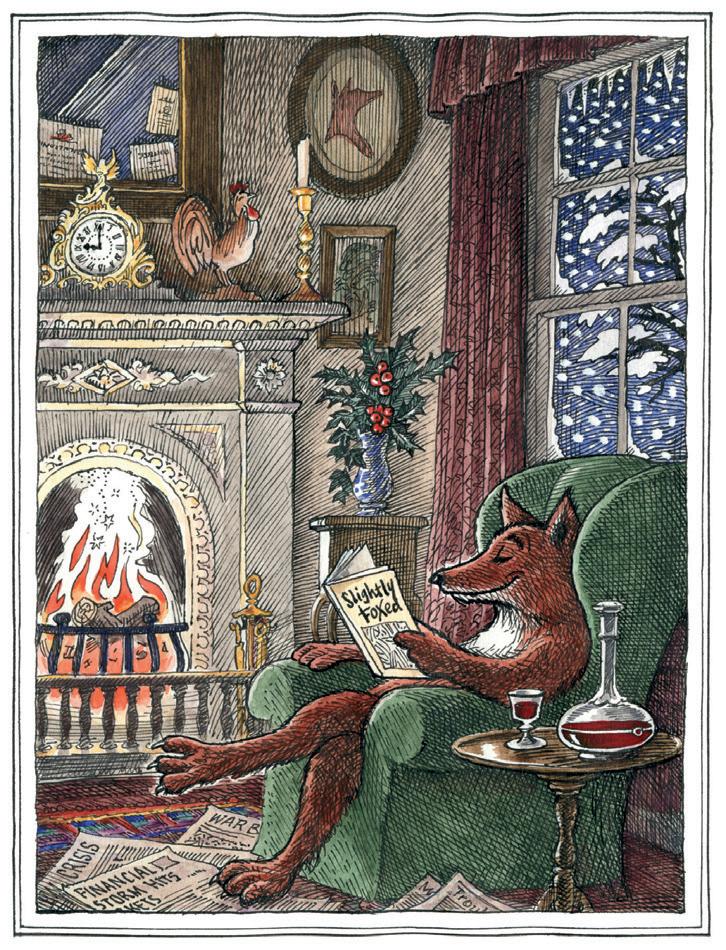

Packs include white envelopes clockwise from top left no. 1, a cheering glass

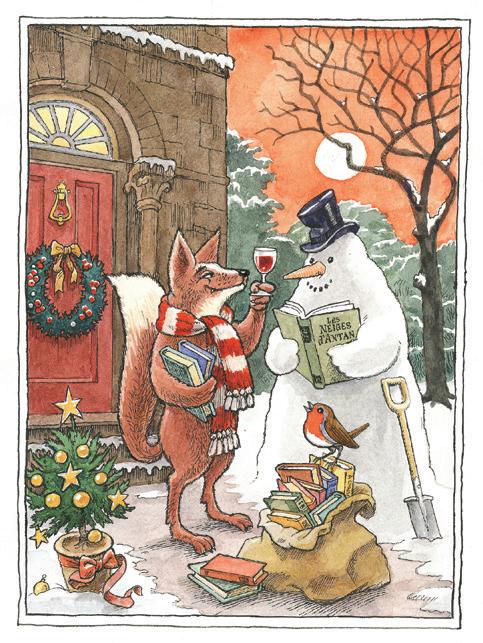
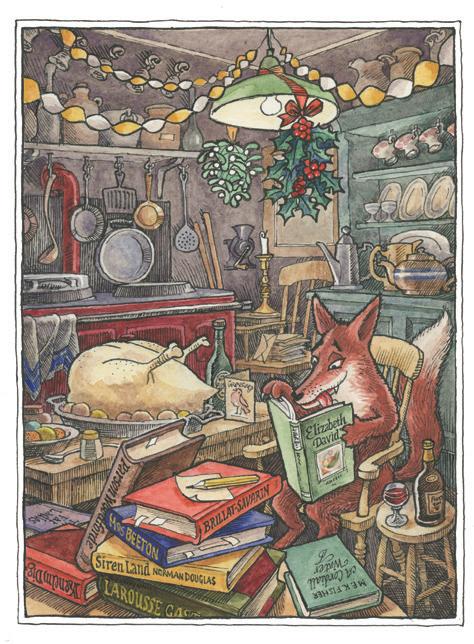
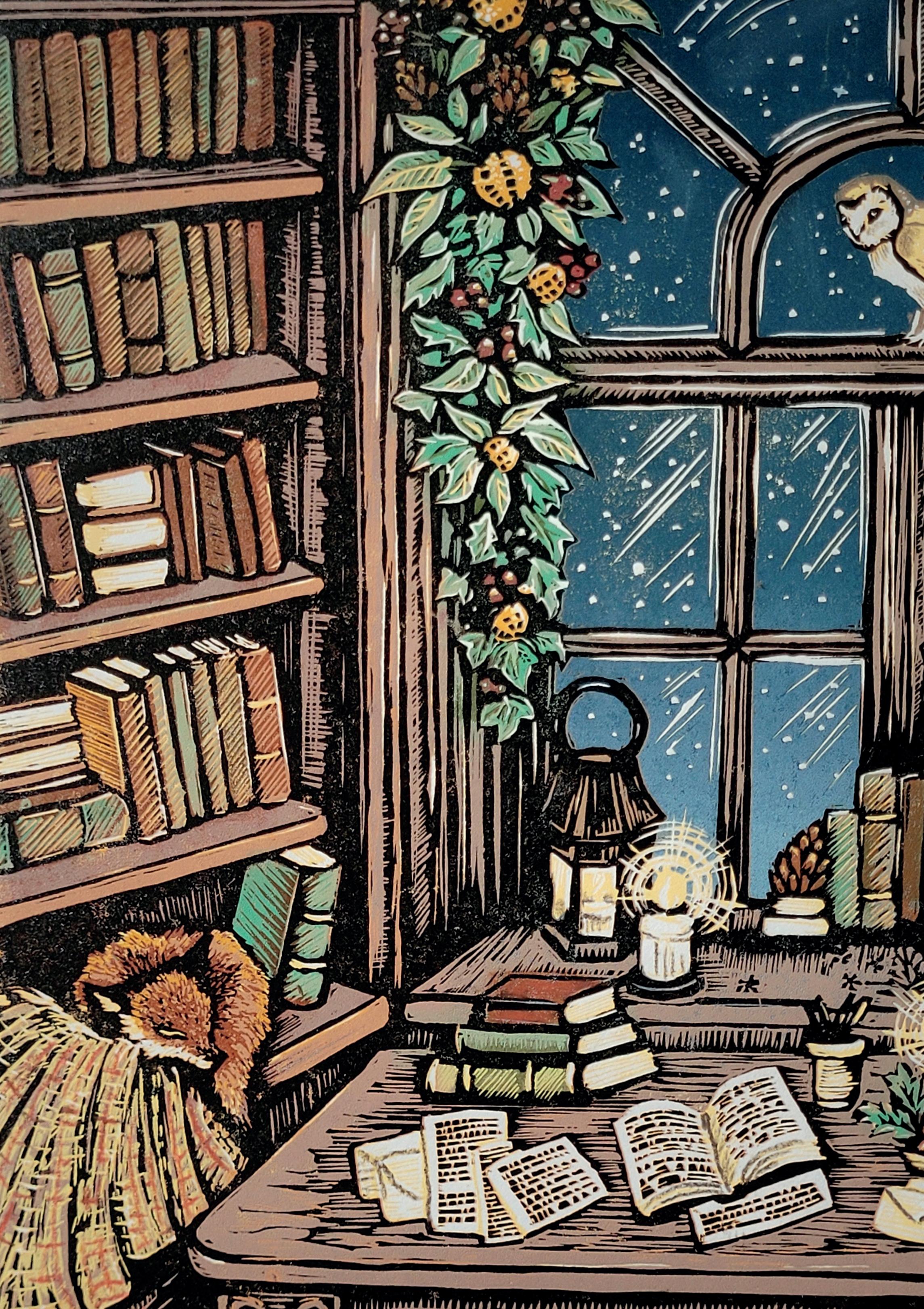
Delightful to read and a pleasure to hold, Slightly Foxed is a real comfort to curl up with when the news – and the economic outlook – is dark, and it makes an ideal present for bookish friends and relatives. So why not treat someone you’re fond of to a subscription? ? You’ll find subscriptions on the order form and more options on our website.
‘A great present for someone who likes books, and for whom you can never think of a remotely suitable present, because you think they must have got everything in the book line they need.’ Independent
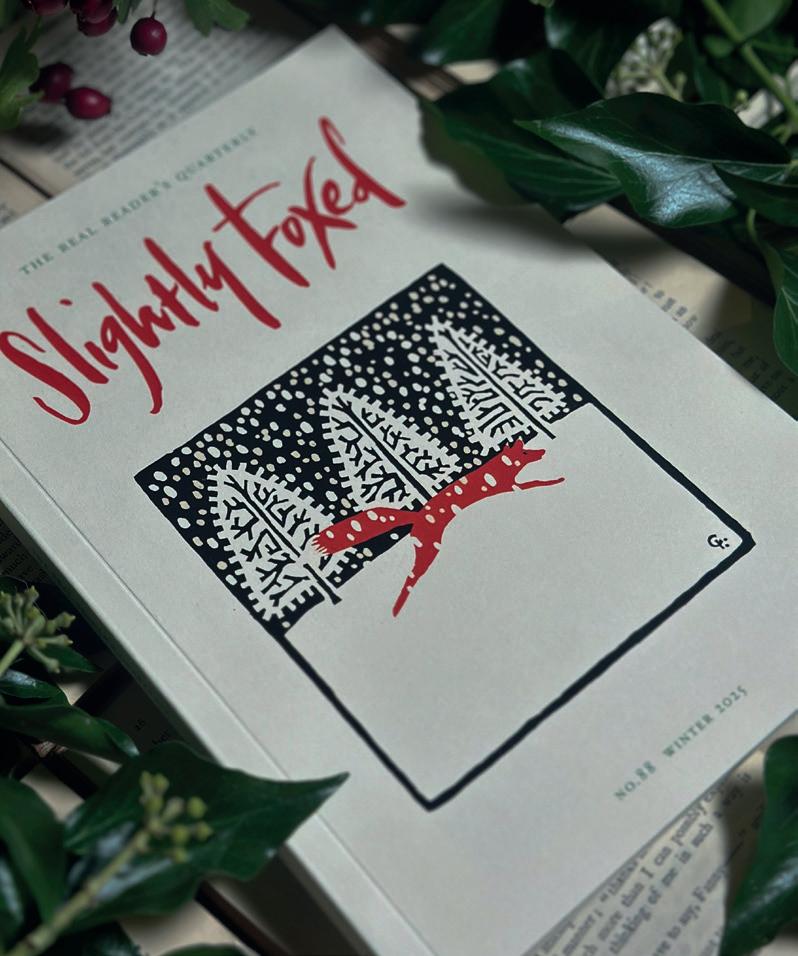
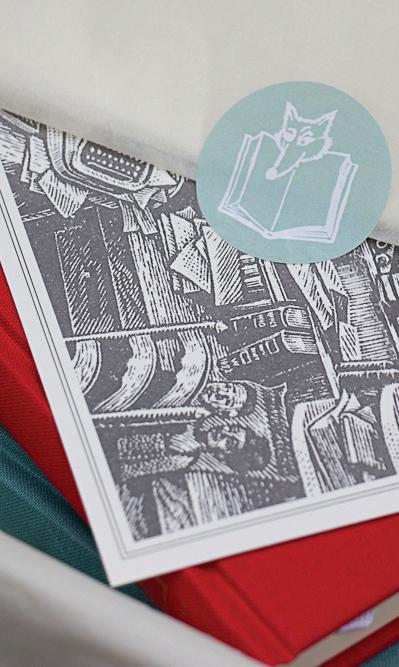
www.foxedquarterly.com/subscribe
53 Hoxton Square, London N1 6PB
Online shop: www.foxedquarterly.com
Telephone order line: +44 (0) 20 7033 0258
Monday–Friday, 9.30 a.m.–5.30 p.m.

